#< not brooding but he is indeed very edgy
Text
'Soft uwu ray of sunshine girl x broody asshole guy is a bad trope!!!'Oh c'mon,i'm just a bisexual who wants to watch another girlboss babygirlify an edgy asf dude without even trying because he does it to himself whenever she's around and sometimes i wanna be the girlboss in question.What are you,biphobic?Grow up
🚫Pro sh///ip and dark content dni🚫
#ichihime#todomomo#huntlow#warren x layla#dickkory#< in the og tt cartoon#ty luko#real self shipping hours#jason todd#summer kent#jaysumm#dabi#makoto yaoyorozu#makoya#marshall lee abadeer#< not brooding but he is indeed very edgy#prim at#marprim#oh and i almost forgot one for the first part:#sasusaku#💌#letters from summer#sky high
80 notes
·
View notes
Photo
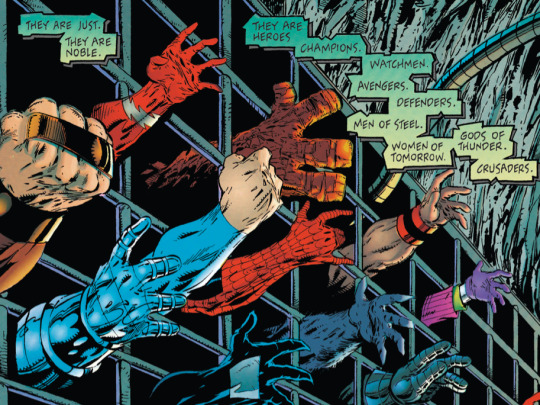
Dave Sim’s Spawn #10
Holy multiverse, Batman! This early (1993) issue of McFarlane’s Spawn penned by Cerebus creator Dave Sim is nuts! Kind of a fun read in the context of the upcoming Spawn “universe” that McFarlane/Image is launching in the post-issue-#300 landscape. This ish has a lot to say about artists’ ownership of intellectual properties and the hope that Spawn represented in the face of the Big 2′s mechanization of their corner of the industry. (Also, a lot of great, eerie art).
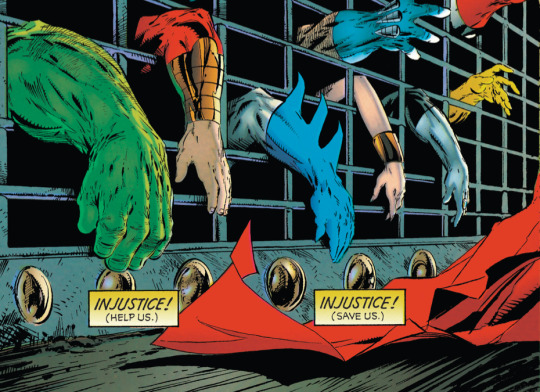
Spawn was coming up on its first full year of publication when this issue hit the newsstands, and McFarlane was celebrating by having some guest writers hop on for a one-off. Gaiman had introduced an angelic huntress Angela in the prior issue (#9) and Frank Miller would write a surely hard-boiled ish #11 after this. But here, Dave Sim in the form of his Cerebus aardvark was to be Spawn’s Vergil through an afterlife of meta-textuality of authorship and the capital-i Industry.


There’s this weird Plato’s Cave-esque metaphor where the creators of famed superheroes from throughout time are held prisoner at the mercy of the Industry because they Sold Out. Or something. It’s sympathetic of course-- as we know, people like Bill Finger (Batman!) had no say in the way that they were left without credit, not to mention control, and an actual finger(s) is pointed at Marvel and DC for controlling and withholding the fate and marketing of properties that shouldn’t belong to them in the first place.

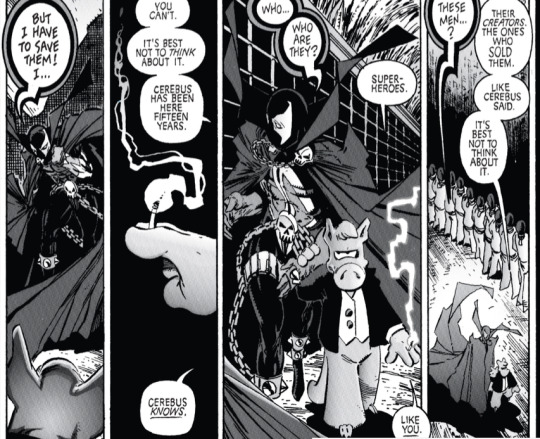
I haven’t read any Cerebus so I can’t speak to that, but I assume this meta, noir tone is commonplace in that book. Spawn up to this point--even in the nightmarishly lucid fantasy romp of Gaiman’s issue-- has been dark, brooding and violent, but not exactly intellectual. A surrealist issue of commentary like this might make us question whether we are to read all of Spawn’s edge-lord grim-dark as actually deep metaphor.
Then again, there’s still some Megadeth-style cheese. Even though the artists, creators and heroes-- which have inspired and paved the way for Spawn and McFarlane-- are all imprisoned, they are still able to blast Spawn full of their magical fourth-world Creativity energy.
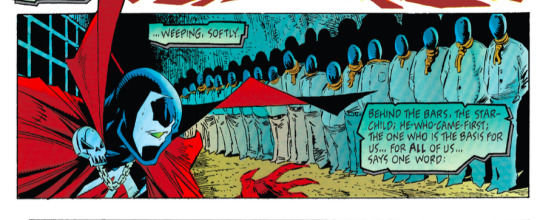



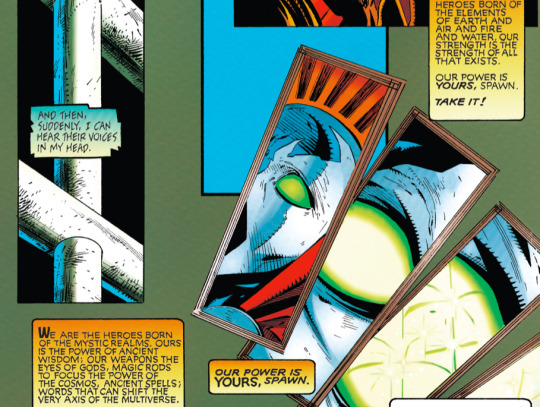
There’s enough detail and intention to warrant reading into this metaphor somewhat, and a lot of heart behind the heavier-handed moments too.
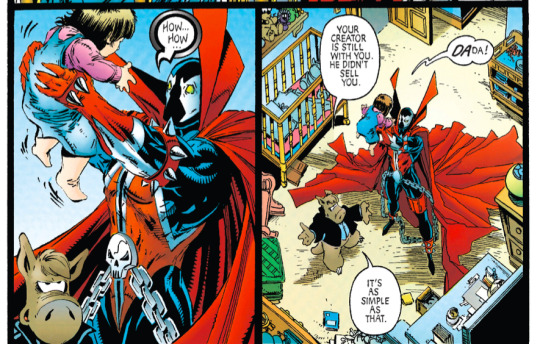
It’s a little off-the-rails for me at the very end when some point is made that his daughter who isn’t actually his daughter is proof that Spawn isn’t sold-out. But uh, sure. And here we are a year or so short of three decades later and Spawn is about to have a big push. I would use the term “come-back” but that honestly isn’t right. Indeed, Spawn enjoyed their big 300th issue a year and a half ago and even then it didn’t seem so much a surprise they made the big 300 and more just a confirmation that Spawn was more than just a 90s trend after all.
Thus the issue takes on more resonance in this context than if, say, Spawn had been acquired by DC or Marvel at some point. Ironically maybe, this very issue would never be truly “acquired” by McFarlane himself, given the appearance of Sim’s aardvark. In fact, Sim sold re-drawn versions of this issue just last year (I’ll leave speculation about McFarlane ironically being stingy himself re the ownership of the parts of Spawn’s mythos that other writers like Gaiman brought to the table to others...).

And to be clear, I’m not saying that anyone is out here hyping all 300 issues and 3 decades of Spawn. It was never about telling the most well-written stories. But Spawn and Image Comics as a whole, and everything McFarlane, Jim Lee and Liefeld were trying to do back in the day during their big shift away from the Big 2 is still pretty endearing, and Spawn is emblematic of that pathos. Of course, the creation of Image ended up being less a departure from the Big 2, and instead re-insisted on the importance and autonomy of the Artist and Creator, so that these artists could eventually return to the Big 2 if/when they wanted. It amounted to a bit of a scolding in the end-- if not an important and due one that should continue to be heeded.
Skip ahead a couple decades and a half and Image and Spawn have both stuck around. Hell, Invincible is currently airing on Amazon Prime, an Image property, created by the guy who also launched a little zombie universe that you might have heard of through the very same publisher! Alas Image opened doors for great creators like Rob Kirkman and by so doing became one of the Big’s itself in a way, and I guess that was always the idea.

And so now Spawn is launching a couple extra books for the first time in a while. Just because it can maybe? In the very first issues of Spawn, McFarlane was insisting on Image Comics as its own universe. The Young Bloods and Savage Dragon all kicking around on the same planet. While Grifter has wound up in the clutches of Gotham recently though (a new trophy for DC colonialism), perhaps Spawn itself has always been enough to sustain his own universe-- no forced, nonsensical Walking Dead or Invincible cameos needed.
And by surviving into the 2020s, Spawn can prove that it was more than just the launch-pad for a franchise of (admittedly excellent) toys. And if naysayers say that a little too much of the 90s itself, hanging like an albatross on Spawn’s shoulder, would be an issue, well, they’re not wrong. The dude still evokes hair metal and speed-metal/thrash alike. Al Simmons reeks of cliche anti-hero power-fantasy and edgy, adolescent machismo, not to mention the actual whiff of molten slices of pizza at scuzzy after-school arcades, amid endless flashing neon screens of side-scrolling beat-em-up’s. [early ‘90′s].
But doesn’t the entire genre have the ghost of the Golden and Silver age haunting its every step? The Old Gods still loom so large, and likely always will. Our current stable of mainstream heroism pulls from the 30s through the 60s basically. Fantasies and fables of the Greatest and Lost Generations through to the Boomers. So, with that being the case, then I suppose Spawn can be the first classic “Bronze age" anti-hero main-stay, a gen-x product if there ever was one. And if you ask me, he made the Hall of Fame in record time.
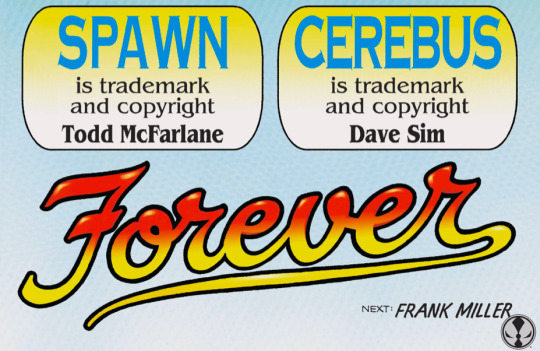
#spawn#cerebus#Dave sim#todd macfarlane#jim lee#spawn universe#frank miller#neil gaiman#image comics#image#invincible#dc#marvel#comic books#comics#indie#artist#independent artist#Robert kirkman#kirkman
73 notes
·
View notes
Text
Doc Loves His Dark Materials
If I were going to regret anything about HDM, it would be that I wasn’t in high school until I read it. If I read it when I was a child, I would have been full-tilt obsessed with it. It was precisely the sort of thing I was always looking for and could never find.
There are a great many YA books that delve into the realm of fantasy, but few of them that inhabit such a fully realized world. Lyra’s world, as it is set up, immediately takes you in, and it manages to almost have an air of urban fantasy, a world that is clearly different from ours, but not so different that it requires a lot of jargon or that it becomes difficult to understand. It is our world, but only off a few clicks.
Daemons are my favorite “personality sorter” of any of the YA books that have them, which is many, because everyone loves to put themselves into boxes while claiming labels are stifling. I also rarely see much discussion about daemons, and I assume this because it’s much more difficult than one’s Hogwarts house or anything like that. Your daemon’s form is intrinsically tied to who you are at your core, and Pullman is utterly unconcerned with overexplaining how they work, and how they are chosen for you, outside of that.
Lyra Belacqua is a fantastic main character in that she has true flaws which are immediately apparent to the reader. It is not that she is plain, and put upon by life, she is not some brooding orphan looking to find herself. She is spoilt, and impetuous, and willfully ignores all the privileges of her life. She is a willful and skilled liar, and there’s a great deal about Lyra that’s not particularly likeable at all, and yet for all that, she feels more fully realized. She is a girl who must come into herself.
And all of this, of course, ties back into the fact that Pullman does not treat his young readers as if they were incapable of handling deeper themes and ideas, or that they can’t read. The narration is often lyrical in quality, the title of the series is cribbed directly from Paradise Lost, and from time to time the book itself quotes poetry. It believes that young readers are capable of higher things. The concepts of grey morality, of desperation, of sacrifice. His Dark Materials is not afraid to question the very wisdom and usefulness of God.
To this end, as I referenced above, Pullman does not feel the need to drill things down to the exact point. It’s actually a lot closer to adult books in this way, that it expects that young readers are also capable of drawing their own conclusions and coming to their own ends. Every time I thought it was going to put too fine a point on something, it would stop, right there.
That is not to say it’s a perfect series, as nothing in life is perfect, and occasionally I roll my eyes at Pullman’s preachiness, but it’s few and far between. Most of the series is a deeply textured, complicated children’s series about maturity, heaven, the difficulties of one’s parents, and also there are witches.
Spoilery below the cut
This is one of my favorite YA series of all time, and might be my favorite if we break it into age groups, being as A Series of Unfortunate Events is clearly meant for a much younger audience. Northern Lights/The Golden Compass (spicy take! The Golden Compass is a better title than the original! It fits with the pattern of The Subtle Knife and the Amber Spyglass, and also with the overarching Series Title of His Dark Materials. Why are you booing me, I’m right.)
I think all YA series want to make their characters’ flaws into eventual strengths, but I don’t think any (that i’ve read) do it quite so well. Lyra’s stubbornness and lying, storytelling, save her ass more than once in a way that doesn’t seem coerced or cheap. I love that eventually she learns how to be less of a liar, and more of a storyteller. That her life can be as interesting as the falsehoods she used to tell, it feels very much like my own experience of becoming and adult and discovering that I had plenty of interesting things to say without telling a lie.
Lee Scoresby is my favorite character of all of them, and I adore him, and his arc is so good, so entrenched with that classic Western sense of just wanting not to be involved, and being unable to stop yourself from getting involved. I was, of course, sad when he died, but there was literally no more fitting end for Lee than what ended up happening, that sense of sacrifice and willingness to die for the sort of idea that a person can hold, that utter loyalty. I still haven’t watched the HBO version partially because I’m not sure I can fucking handle him being played by Lin Manuel Fucking Miranda. Who also played ~the cockney lamplighter~ in the new Mary Poppins because I’m not allowed to enjoy anything.
People are often surprised that I love HDM because it’s intensely anti-religion, and indeed, there are a handful of times that Pullman’s edgy atheist act annoys me. But in fairness, it’s MOSTLY not my religion taking the punishment, in that Pullman, like most Culturally Christian Athiests, assumes all “abrahamic” religions are the same, despite all three of them (or four, if you count protestant as its own thing) being vastly fucking different in approach and belief. So, really, I don’t get hit that much. But also rather than JUST being like “RELIGION MAKES YOU NAUGHTY” which is about as deep as it goes in The Golden Compass, it ends up taking the tack that God is nothing but a powerless old man who WANTS to die, who is being held up only by those who wish to bring war and strife. What a concept! Amazing! Not where I expected it to go at all.
Also the fucking courage to show dissolving into the world as being preferable to some form of eternal life? FUCK ME. I was so absolutely struck by that, as a religious person who, probably 70% of the time, really can’t deal with the concept of an afterlife. It seems so overwhelming to me. I thought the whole thing was done beautifully.
And its not as if he doesn’t punish both the religious and not alike--despite everything, Mrs. Coulter and Lord Asriel both end up hurling through the abyss because neither of them could every really move from their positions. In bringing down the Voice of God, they also must destroy themselves, built around this idea of upholding god and destroying god in equal measure, they cannot stand without him. I mean shit! You’re not gonna see that in Harry Fucking Potter, which built up the necessity of a hero’s sacrifice only to pull it out of the ass.
The way that Lyra’s parents are both villain and hero, at turns, and how you come around to be like, ‘Wow, you are both assholes” even though they are on opposite sides, is remarkable. How many times how you read YA and it’s been like “oh my long lost and/or dead parent is wonderful!! How I love/miss them!!”? HDM does not fuck around with parents. Lyra’s parents are enemies and completely corrupt weirdos, Will’s mother needs him to take care of her in a way that is NOT made cute, and his father just fucking fucks off and dies the minute Will meets him. It’s a thing I didn’t realize I saw so little of in YA until I saw it here.
I completely expected, braced for, and readied myself for Will and Lyra to end up together, and I was so fucking pleased that they don’t. It’s refreshing to be proven wrong, to have an author not decide that the boy and girl need to get together at the end of it. And it’s remarkably low drama.
28 notes
·
View notes
Text
Historical Ancient Norse Clothing vs. Pop Culture
I have a bone to pick with movie and TV costuming of vikings. It seems like pop culture has it own surprisingly consistent (but very wrong) idea of history. As someone who is really into historical clothing and also into Ancient Norse, it brings me physical agony. I’m going to explain with examples. I’ll use three recent shows, Vikings, Norsemen and Last Kingdom. Now keep in mind that I have only watched bit of Norsemen and I actually really liked it, so this has nothing to do with the overall quality of the shows, only the costuming. I picked these shows because they all seem to present themselves very “realistic”, which is why I leave movies like How To Train Your Dragon be, because clearly they are not attempting realism or historical accuracy.
Also, I’m not a historian, and even if I were, there is no way to know what people at that time were actually wearing. There is archaeological evidence and a little historical evidence too, but for some things even historians just have to give their best guess. I’ve done casual and no way academic research for my own projects. If you want to read more yourself, my best resource is Viking Answer Lady. The articles go very into detail and have a lot of historical and archaeological sources.
Okay let’s go. This is going to be long.
Gripe One: “We want to make our show seem gritty and realistic, so clearly we should make our vikings dirty and wear only back and muted colors so they look edgy”

Yes, those pesky vikings, who had bad personal hygiene, wore ripped clothing and hated colors with passion. They were, after all, Menly Men (in 21th century standards). Okay, jokes aside, maybe from my sarcastic tone you can tell that indeed Norse people had very high standards for personal hygiene. According to contemporary records, they washed their faces every morning and bathed regularly in their warmed bath houses. Every man and woman had a comb with them all the time and men also combed their beards and mustaches. Sewing was also a standard skill (especially for women but probably also for men) and people generally in most periods and places before industrialization, including Ancient Scandinavia, were very skilled at it. The wool they used was very high quality and tightly woven into sleek fabric. They also used linen and if they were rich they might have worn silk.
The picture is from The Last Kingdom. The person in the middle is a son of an earl (a local chieftain, so pretty important nobility). Nobles could afford high quality wool, dyes, embroidery and good armor (not yet, but we’ll talk about it soon), and of course nobility wore those things to distinguish themselves from other classes. Norse people wore actually quite a lot of colors, and very bright colors too, especially the richer ones. Probably only slaves didn’t have their fabrics dyed.
And another note about Norse people’s concept of masculinity. Their concept of manly man for example was a very talkative, social and funny guy, who was a good leader, laughed easily and had many friends, brooding dudes were not the ideal. Being fashionable and presentable was also very important for men. They trimmed their beards and mustaches to be neat. Some carvings have men with very dapper mustaches and goatees. Noble men had long hair. Though they would braid them somehow for battle.

The other two shows have same problems. This is from The Vikings and the guy in the middle is a son of a king* and he wears literal rags.
*Apparently Ragnar in the show is farmer rather than royal lineage like in sagas, but farmers dressed well too, though not as well as kings.
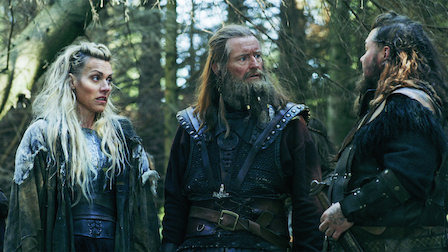
More dirty clothes without colors in Norsemen.
Gripe Two: Okay let’s talk about armor
Armor is certainly not only problem in historical shows about vikings, but in most historical shows and movies, period. Let’s start with what people really wore into battle back then. It would of course depend on their wealth and social standing so let’s start with the absolute minimum.
First they wore underclothing, usually linen tunics. Over that wool tunics. Linen is very easy to wash so it gathers all the sweat and the wool is preserved in better condition. Over that they would wear padded armor. It was armor made from cloth and padded thick with usually horse hair. It was actually very good armor and shielded well from cuts, though not so well from stabs.

Helmet and a hood under it was a must. Battle without helmet would have been a death sentence and helmet without hood did very little to actually shield head. The hood would also shield neck which was just as important. Also leather gloves. It would be hard to hold your weapon and defend yourself, if you’d get hit on fingers.
This would have probably been a basic armor for a peasant. Warrior class and nobility would have better armor though. Padded armor was used combined with other armor. Plate armor was not really a thing back then, but chain mail was probably the most used one. It was expensive to make so peasants couldn’t afford it, but it great against stabs and slashes, and on top of that was flexible and didn’t restrict movement. You couldn’t use it without enough padding under, just try to think about the iron rings sinking into your flesh... A chain mail hood also might have been used over the softer hood.

Other options for chain mail were lamellar, an armor stitched from small plates of metal, and leather armor. Lamellar gave great protection, but since it was a bit restrictive, it was probably only used as breast plate, so if a warrior was rich enough to get that, they would also get a chain mail under it. Leather armor was not very good alone, but combined with other types of armor it gave some extra protection. A really thick leather with fur (for example reindeer fur) would have been used like padded armor. Leather was probably made in the form of a tunic. Basically it would been only used alone if it was really thick or had fur too. Lastly they would have used a cloak or a coat depending on weather.
Now, after seeing the couple of shots from the shows, you may start to see a problem.

I tend to forgive movies and shows the lack of helmets, since it makes it harder to know who is who and what is happening in a battle scene, which after all, is much more important for a story than historical accuracy. However, they have literally no excuse for the lady warrior to have ONLY a leather top (????) on. Norsemen is comedy, rather than historical drama, but the aesthetic is realistic, so I’m not going to let them of the hook. (And may I point out the dude behind the lady warrior? Is... is that supposed to be a chain mail? I’m confused.)
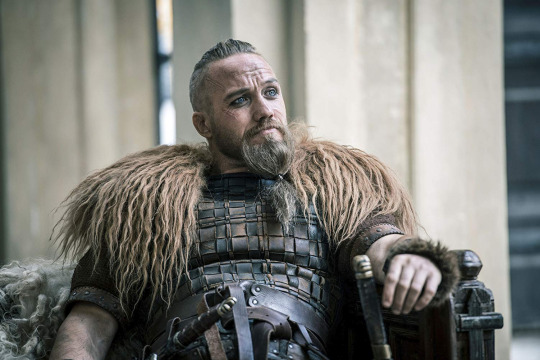
My dude, your hands will get chopped off... Please don’t wear a leather top or a t-shirt into a battle. Unarmored arms would really get lost. If you got a deep cut into your arm in that period, you had a really high change of loosing that arm.

This is from Vikings and I wanted to include it as a slightly positive example. He is wearing leather armor (which looks weird but let’s ignore that) over chain mail, so it’s actually very good protection!
Gripe Three: Women’s clothing is all over the place
I have yet to see a remotely accurate Ancient Norse women’ clothing on screen.

Most of these from Norsemen look like 12th or 13th century dresses, the way how they are very fitting on hands and upper body. Most bizarre is the girl on gray clothing on the background. What is it? Why it looks like weirdly ripped and like it’s sewn by someone who’s never before touched a needle?

Then Vikings. Let’s ignore the guy in the picture (he is a king but wears no colors and some weird looking leather armor, moving on). Both of these ladies are queens and they should have bright colors (also hair up, only unmarried young women and children wore hair down). The lady on the right has a little better outfit. The cloak looks actually really good, though not sure about the texture. The dress however is pretty bad. The lady on the left is just wrong. The neckline would have never been this low. Why is it brown? And what is that belt thing? Norse people used a lot of layers, and it was also kind of a status symbol to have a lot of layers of bright clothes. Let’s hope she has a very well hidden under-layer for her hygiene. And lastly the jewelry looks more from 16th century or something for both of them. Viking ladies used a lot of jewelry, and queens would have had very showy jewelry. Let’s look at a lot more historically accurate clothing.

This would have been something a noble lady could wear. They wore of course under-layer, then a dress long tunic over that, over that, a usually slightly shorter dress with shoulder straps and then a narrow apron which was attached into the shoulder straps with showy fasteners and between them was usually hanging some jewelry. The outfit might have had a long twined belt around the whole thing too. And as in the picture, a lot of embroidery for the rich people.
I know they think edgy black clothing is inherently cooler, but...
Really I think the accurate clothing is really cool and badass. Like let me show you some pictures of reenactors to prove it.
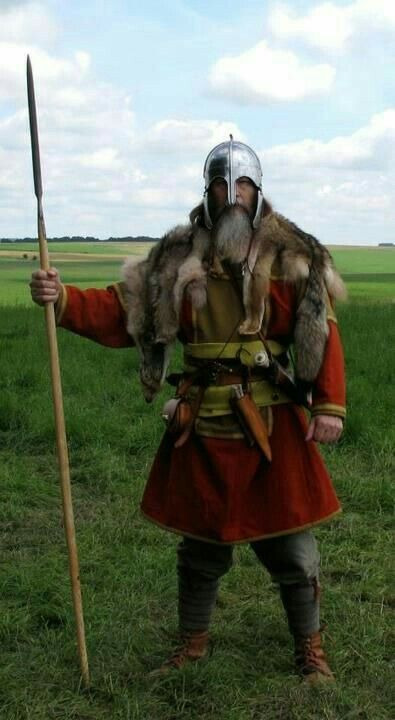

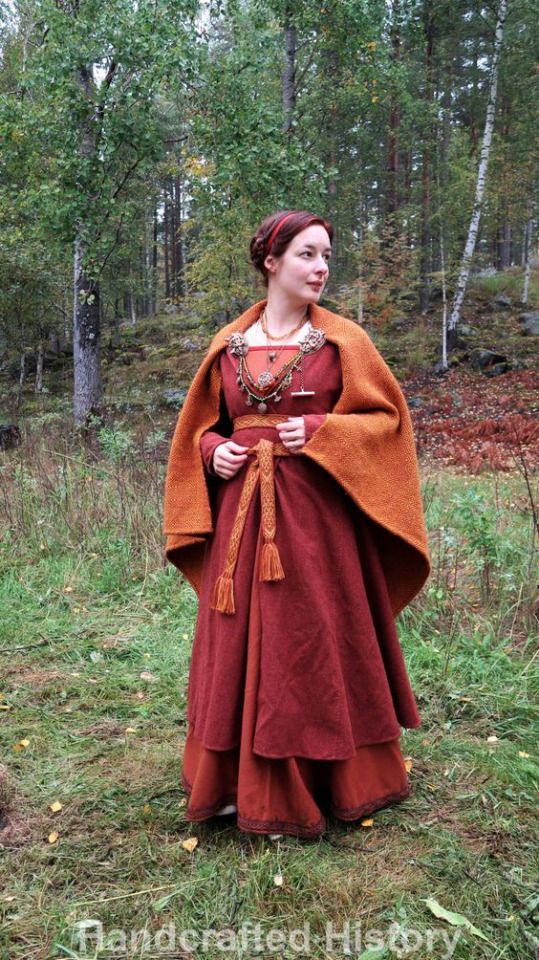
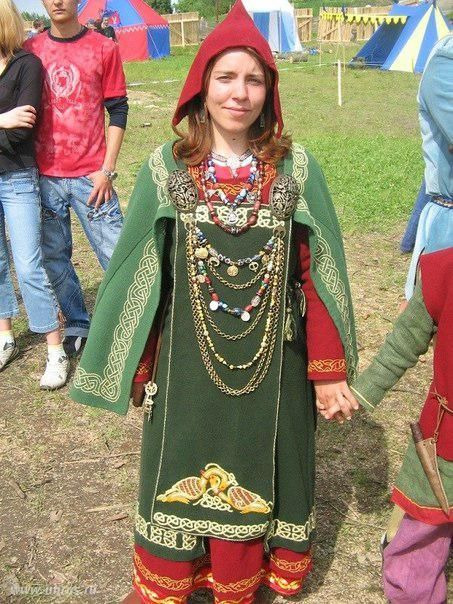
Bonus Non-Gripe
Also lastly I just want to say, this outfit from Vikings slaps. It’s gorgeous, it makes little sense, but I love it. Let’s pretend he has padded armor under the tunic, okay.
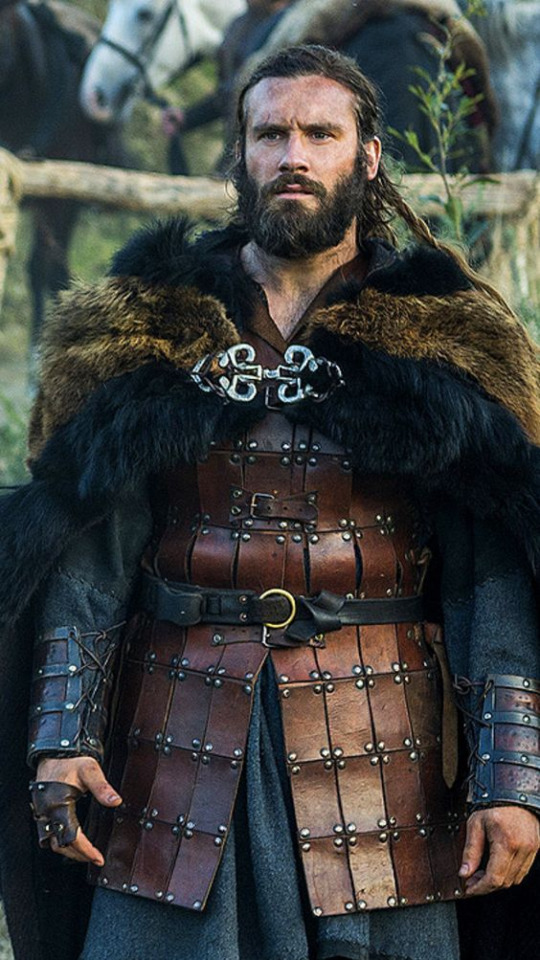
#history#historical clothing#costume history#viking#armor#viking armor#historical accuracy#historical fiction#costuming#tv costuming#historical drama#ancient norse#ancient norse clothing
260 notes
·
View notes
Text
271. Sonic Universe #4
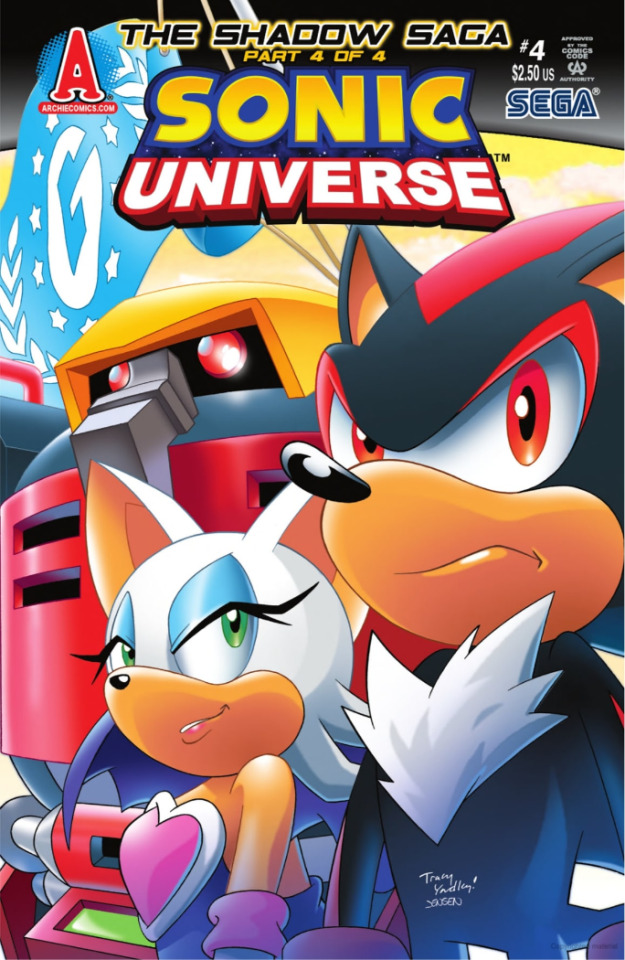
The Shadow Saga (Part 4 of 4): The Ultimate Lifeform
Writer: Ian Flynn
Pencils: Tracy Yardley!
Colors: Jason Jensen
Before we get started, it's important to note that this issue likely takes place a short time after the upcoming two issues, but for the sake of continuity as well as plot pacing, I've decided to cover this one first, especially since it doesn't overlap with the events of the next two issues at all. Shadow and Rouge are suited up and ready to go into the Special Zone in search of another Chaos Emerald, and Shadow is unconcerned, as he thinks the mission should be fairly routine. They're teleported into the zone by Hope's device, and sure enough, the giant freaky panda god Feist is there, ready to test some mortals for funsies in return for a Chaos Emerald.
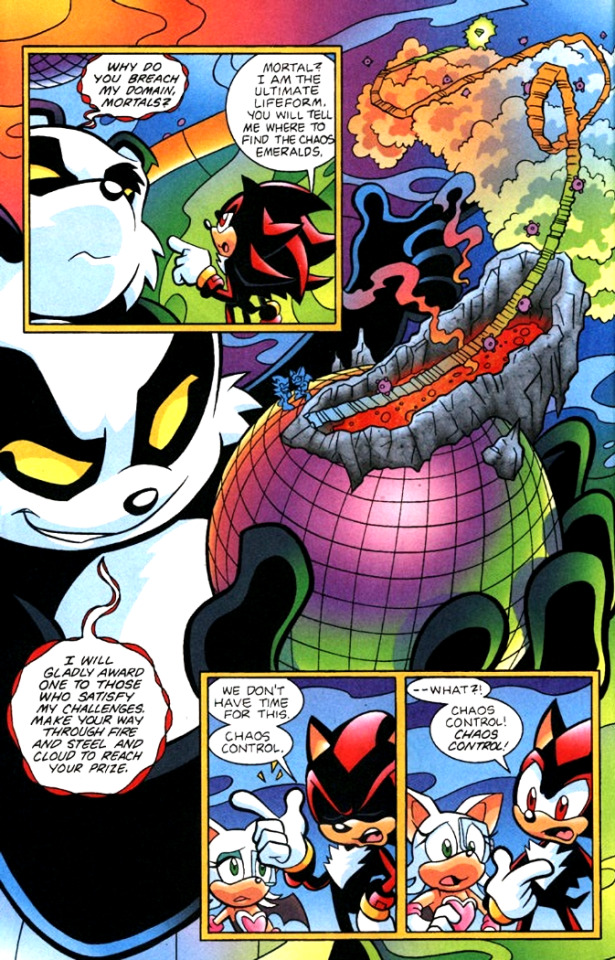
Feist cackles and says that since he creates the rules of this zone, Shadow's own powers won't work, as even if he's the "ultimate lifeform" Feist is a god and therefore holds power over him. Shadow and Rouge quickly start trying to navigate Feist's little maze, using their respective strengths to dodge obstacles, but Feist has deliberately set them up for failure, and laughs at them as they run out of time just a moment before Rouge can grab the green Chaos Emer- wait, what? The green emerald? That one was already retrieved from the Sol Dimension! For whatever reason, Jason apparently completely forgot that not all the emeralds are green anymore, and miscolored this one, which was intended to be the red one. Ian handwaved it away later by saying Feist made it look that way to confuse them or whatever, but the color was also quietly corrected to red in future reprints, so it clearly wasn't intended. Anyway, Shadow and Rouge are booted out of the zone without their prize, much to Hope and Commander Tower's shock.
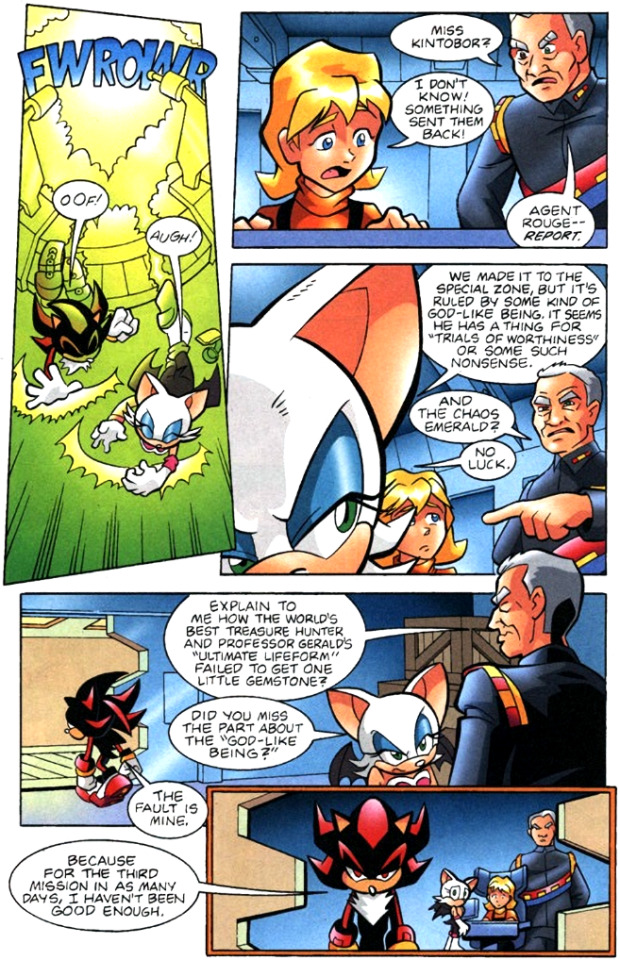
Okay, first of all, Tower, there's literally no need to be an asshole about this. There were already problems just getting into the Special Zone in the first place, it's downright idiotic to think it would just be a total piece of cake to retrieve one of the emeralds within after all that. And second of all, for goodness' sake, Shadow, stop blaming yourself for goddamn everything! Oh no, you didn't immediately succeed at everything you've tried! Ultimate lifeform or not, you're still an ordinary sentient being with ordinary sentient thought processes. Shadow, moping and upset, heads to the facility's gym and begins beating the crap out of Omega, who is surprised and makes a weird comment about how it's he who "usually" comes to Shadow for sparring practice. I'm… a little baffled at this comment, honestly, because it makes it sound like Omega's been around for a while now and he and Shadow regularly beat each other up, even though the very last issue implied that this issue's story is taking place like, the day after recruiting him. But anyway, Shadow dodges all of Omega's questions and attacks, while Omega rather tactlessly points out that now that he's received his clearance for duty, he can come with them on their next mission and blast Feist for them. This pisses Shadow off, and he stalks away to find a quiet spot near the top of the base.
Oh, speaking of which, has anyone been wondering where GUN is actually based? We know they're part of Station Square's security force, but multiple past issues have made vague allusions to the United Federation having more than one territory around the world, and generally being a lot bigger than it was previously portrayed as being (remember when the Mobians and entire outside world didn't even know Station Square existed? Ah, the weird old days). Well, here we get a clue as to where this GUN base is located. Shadow is moping at the top of the mountain that houses the base, and Hope appears there too, surprised to see Shadow as she'd thought this was her own personal hidden thinking spot. She tries to make conversation, enthusing about the view and how "On a clear day, you can see all the way to Soleanna!" I've already noted that Sonic '06 technically took place, if you can call it that, in the comics universe, so obviously Soleanna would have to exist as well. My point here is more about the location of Soleanna. The aesthetic of the kingdom's capital city is vaguely Venetian, indicating it's probably located somewhere analogous to modern-day Italy, so for it to be visible from the top of this mountain, this GUN base would have to be somewhere in Europe. Because I'm extra, I took a look at the position of these two relative to the sun in the background, and if we assume this scene takes place in the afternoon, then the base would be somewhere north of Soleanna - so if Soleanna is indeed located on the coast where Italy currently, then that all checks out nicely. Just a fun fact for y'all!
Anyway, I'm getting way too into the small details here. Hope, noticing that Shadow refuses to make conversation despite her efforts, tries to comfort him, but Shadow just insists that since he's the ultimate lifeform he's not supposed to fail. This is, of course, ridiculous, and Hope points this out, adding that in her opinion he hasn't failed as badly as she has. She tells him the story of how Snively encouraged her to leave Knothole and how she feels too guilty to go back after its destruction, which rouses Shadow somewhat, becoming concerned when she starts to cry. He tells her that leaving was hardly a failure, that she had no way of knowing what would happen and that it wasn't a bad thing to want to push her own boundaries by exploring her role in the world. She smiles and fires back that he can't blame himself for his own failures then, and points out that in the end his "failed" mission was actually excellent reconnaissance and that now that he understands better what he'll be facing, he's just set himself up for future success. This makes Shadow pause, as he's obviously not thought of it like this before.
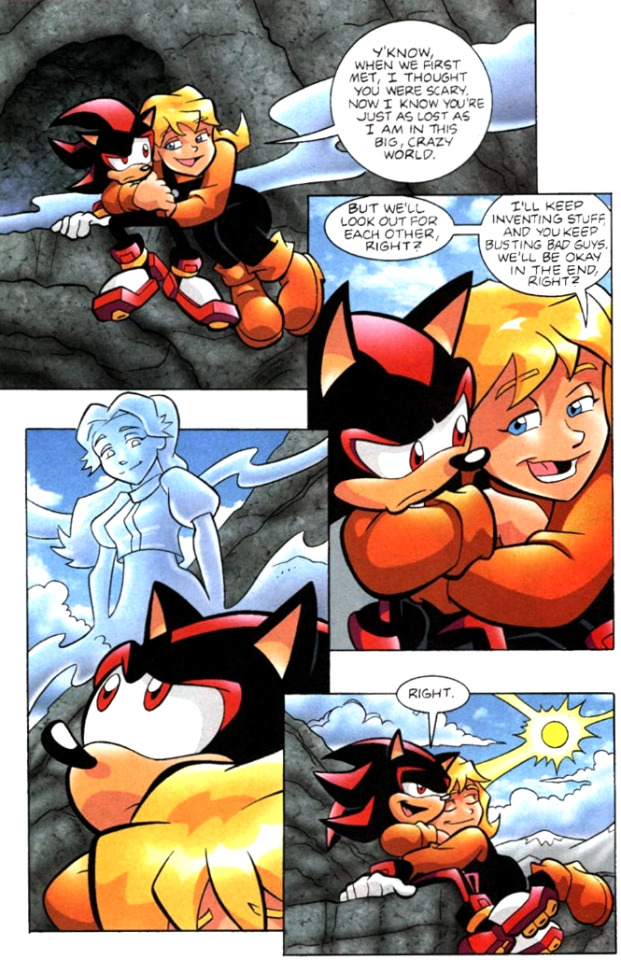
Now that is how you write a Shadow. It's weird when people try to characterize him as this edgy, brooding, angry violent character who would never allow himself to be soft or emotional. Sure, he has an ego that he has to protect, and he likes to show off how tough he is on occasion, but Hope's analysis here is accurate - he's literally an eternal teenager who's just trying to figure out where he belongs in the grand scheme of things. Furthermore, Shadow the Hedgehog is great with children and no one will ever ever change my mind on this. So there.
Soon after their talk, Shadow, Rouge, and Omega have gathered at the teleporter for their next foray into the Special Zone. They've christened themselves "Team Dark," something which Rouge and Hope both seem a bit baffled at but which Tower seems to think is apt. They make it back into the Special Zone, and when Feist gloats at them for coming back for another round, both Omega and Shadow become riled, wanting to go on the offensive, though Rouge holds them back. Feist conjures up another challenge for them, this time in the form of a weird 3D-cube-maze-thing, and mocks them as they do their best to find the center. They eventually end up in a chamber with spikes at the bottom and the Chaos Emerald at the center, but Feist covers the emerald with a bunch of multicolored, useless gems, giving Omega the chance to use his beloved guns to blast a hole in them, giving Shadow an opening.
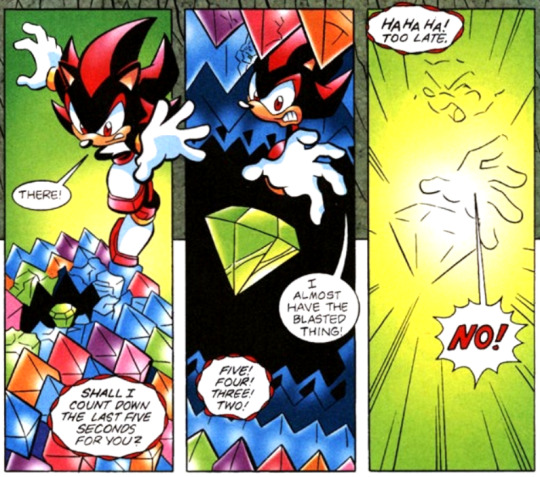
Feist, you're a real asshole, you know that? He brings them back to his sphere… platform… thing to mock them some more, and Omega begins begging for the chance to pursue "Plan B" like an excited child on Christmas. He's delighted when Rouge gives her permission, and immediately launches half his weight in ammunition into Feist's face, having to be literally dragged away from the screaming panda by Rouge to prevent him from standing there and firing at him for the rest of the day.
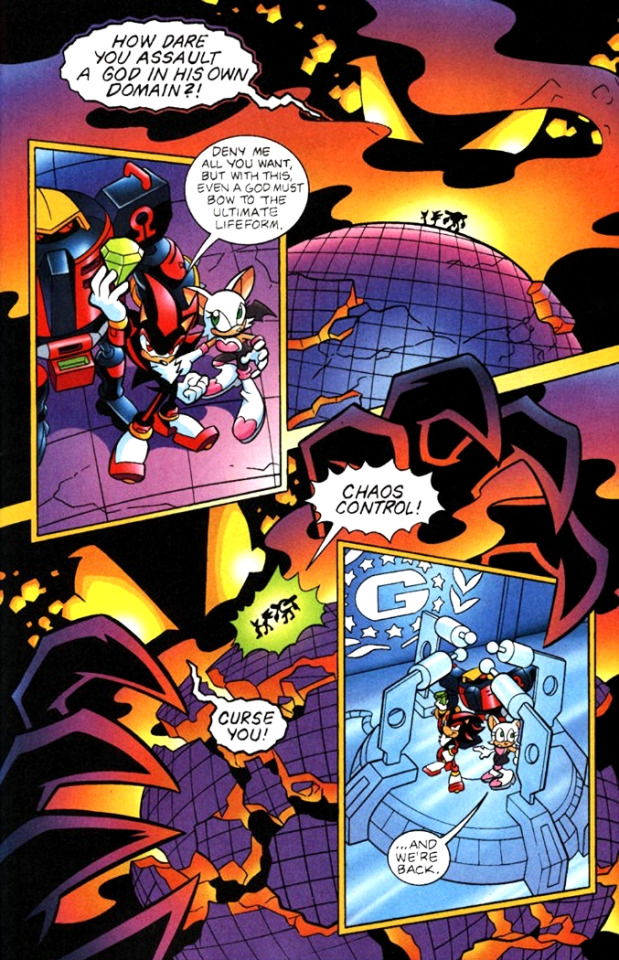
Woo! Go Team Dark! Hope hugs Shadow and congratulates him, and Tower is similarly pleased, accepting the emerald from his agents and eager to make GUN a "force to be reckoned with" with the power of their two emeralds. Normally, that statement might set off a few red flags, especially concerning these guys' history of, y'know, murdering innocent terminally ill children who get in the way of their bullets, but luckily fifty years has been enough for them to change for the better (I sincerely doubt Shadow would ever agree to work for them otherwise). This issue ends with a single page teasing the next arc of SU, featuring an adult Knuckles and Julie-Su getting ready to leave on some kind of trip and trusting their daughter Lara-Su to take over things while… they're… oh for the love of Chaos, this again?! We're really going back to the future? Only this time, it's thirty years into the future instead of twenty-five. Ugh, I wanted to be done with this AU, but I guess we're careening right back into it… But first, of course, the two-part finale to the sixth era of the preboot, the shortest era so far!
#nala reads archie sonic preboot#archie sonic#archie sonic preboot#sonic the hedgehog#su 4#writer: ian flynn#pencils: tracy yardley#colors: jason jensen
16 notes
·
View notes
Text
Would I Were As Steadfast, 1.5k, finrod/curufin, this is real rough but I’m sick of staring at it so here goes nothing
---
Finrod was up late, drafting a letter to his sister. Nargothrond seemed almost too quiet. The calm, he thought, before the storm.
The door opened quietly and he looked up, then back down. “I wasn’t sure whether to expect you or not,” he said. His cousin didn’t smile. Finrod sat up, set down his pen, and stood. “I suppose I shouldn’t have wondered.”
Curufin’s dark eyebrows arched, both rising ever so slightly. “Meaning?”
“Nothing.” Finrod sighed. “I suppose it would be useless to ask…” he trailed off.
“Ask what?” Curufin’s voice was deceptively gentle. Finrod closed his eyes and shook his head.
“Never mind. What did you want?”
“You’ve gained a suspicious nature, cousin,” Curufin said lightly. Finrod could see the tension in him, though. Before…in Aman, he might not have. Even three months ago, he might not have. They knew each other a little better now. Perhaps too well. Finrod shot him a tired look, and Curufin smiled thinly. “I have no intention of asking anything concerning the human whelp.”
Finrod drew himself up. “That ‘whelp’ had a father who was a good friend of mine.”
“The son is not the father.” Curufin’s voice and expression briefly betrayed exasperation. “You are being unaccountably foolish about this. What the boy intends is…impossible, on any number of levels. You must see, Findarato, that Elwë does not intend him to live. With things as they are-”
“Do not plead diplomacy with me,” Finrod said sharply. “I do not doubt Elu Thingol intended Beren to fail. That does not mean I am required to watch him do so and lift no hand, nor does it remove the bond of friendship and oath of aid between myself and his house. You know that.”
For a moment Curufin looked as though he would argue, and then glanced aside and exhaled, shaking his head. “I suppose I might have expected as much. We shall see what tomorrow brings, I suppose.”
What are you planning, Finrod thought. What are you going to do? You and your brother will never allow me to commit forces to retrieve a Silmaril for hands other than yours, not willingly. There was no point in asking, though. “I suppose we shall,” he said, keeping his voice deliberately neutral.
Curufin watched him, seeming to be thinking. “Come to my rooms with me,” he said, suddenly .
“I have a letter to finish,” Finrod said blandly. Curufin took a step nearer, gaze that intent, intense stare that nearly unnerved Finrod but also…
“Finish it later.” Finrod met his cousin’s gaze squarely and found a trace of unaccustomed impatience there.
“It’s to my sister.”
“All the more reason.” Finrod gave Curufin a sharp look, and his cousin merely looked amused. “I jest, Findarato. You have a long day ahead of you if you purpose to help your human. Allow yourself a few moments’ peace.”
“You seem a strange one to speak of peace,” Finrod remarked. Curufin smirked.
“Am I? I am hardly the brawler that – say, Tyelko - is.”
“A disinclination I suspect has more to do with the physical than the temperamental,” Finrod said, with a rather pointed glance down the few inches that separated his cousin from him. An old tease, and Curufin allowed himself just the slightest hint of a sardonic smile.
“I’d think by now you’d have come up with some fresher material, cousin.”
“Why should I, when the old is still ripe?��� There was, he was aware, a strange sort of fragility to their teasing. An undercurrent of something unfamiliar. “Kurvo-”
“Don’t be tedious, cousin,” Curufin cut in. “You have duties, yes. You have letters to write and business to attend to. You always have. Is that what you want to do?” He took another step closer, near enough for him to reach out and brush Finrod’s jaw with just his fingertips, and then drew them away. Finrod caught his wrist before it fell to his side.
“A glass of wine,” he said, firmly. “No more.”
“No more,” Curufin agreed, with a slight glint of triumph in his eyes that frustrated Finrod, irked him. “Just a glass of wine, and then you may return to your duties, and I to mine.”
**
Curufin’s wine was slightly too dark for Finrod’s taste. He drank it anyway, a full glass in a few swallows. Curufin raised his eyebrows.
“Such eager consumption is uncharacteristic of you, cousin.” Curufin sipped at his glass. Finrod held his out for more, savoring the rush of wine to his head on an empty stomach, the warmth spreading from his stomach.
“It’s been a…trying day, I think you’ll agree.”
Curufin’s expression did something curious, but Finrod could not quite identify it. “I’d sooner not speak of that.”
Finrod didn’t really want to, either. He let it go, and as Curufin did not seem about to, poured his own second glass. He took a gulp, held it in his mouth, and swallowed. Curufin was watching him sidelong and Finrod cast him a look.
“If you are going to criticize…”
“I would never.” Curufin lifted his glass in Finrod’s direction and had a sip of his own wine. Finrod gave him a flat look.
“You seldom do anything but, in my experience.”
“Now. That’s not precisely true.” Curufin sounded delicately affronted. Finrod gave him a flat-eyed stare, and Curufin’s mouth twitched at the corners, though barely. “You don’t always find my counsel unwelcome.”
“When I want it, I shall ask for it.”
“You seem in a poor mood.” Curufin’s eyes were sharp, looking at him over the rim of the glass. “Perhaps I ought to leave you to your…brooding.”
“You invited me to join you, cousin. Not I.” Finrod looked down at the wine, deep red. The color of fresh-spilled blood. Be at peace. You need not run ahead to the worst.
It may come to you on its own.
“If you’re simply going to sulk…”
“I am not,” Finrod said, perhaps a little sharply. “And I will thank you to stop – whatever it is you are doing.” Sometimes he thought Curufin saw him as a piece of metal, to be hammered at until it bent into the shape he required. An unusually stubborn piece of metal, perhaps. Sometimes he wondered if Curufin saw anyone as anything else.
“Whatever it is I am doing. Indeed.” Curufin’s voice was almost a drawl, and his eyes remained opaque, nearly expressionless. Finrod set down his glass and stood in a sharp motion.
“I am in an ill mood to entertain your games, Atarinkë.” The choice of name was deliberate, perhaps a bit petty, but he felt tense and edgy. He had even before Curufin had come, and with him it was only intensified. “Goodnight.”
Curufin didn’t reach for him. His voice was clear enough, though. “Wait.” Only he, Finrod thought, could make a request sound a demand, and yet still a request as well.
Against his better judgment, Finrod turned. “What do you want, cousin?”
Curufin looked at him, head cocked a fraction to the side, corners of his lips turned down in a slight frown. His gaze, sharp as a knife, pulled Finrod as it always did – like the sucking draw of the sea’s treacherous undercurrent. “Many things, cousin.” His voice was soft.
“And just now? Of me?”
“Many things,” Curufin answered, in the same tone. Finrod’s jaw clenched.
**
Curufin’s fingers traced characters on his chest, but if he was writing words Finrod could not identify them. His touch was light, skilled, reminding him as always of the way Curufin’s fingers ran over metals, seeking out small flaws in need of correcting.
His fingers ran over to Finrod’s shoulder and down his arm, over his hand until they brushed the ring he’d given to Barahir, resting again where he’d taken it from years ago.
“You’ve made your choice,” Curufin said, after a moment, quietly. “Your plans. The discussion you will have with your lords tomorrow is…a formality, nothing more.”
Finrod closed his eyes. “Yes.” Will you ride with us? He half wanted to ask, but did not want to know that the answer would likely be no. “Nargothrond will aid Beren son of Barahir in his quest.”
Silence, for several long moments. Finrod felt a cold foreboding sink in his heart. “I see,” Curufin said finally, barely audible. He shifted, rolled over, pulling his hand away. “Goodnight, cousin. Rest well.”
“And you,” Finrod said, after a moment, frowning very slightly. “Tomorrow…tomorrow we can speak of this further.”
“Yes,” Curufin said, after a few silent breaths. “Tomorrow.”
**
Had he known?
Sitting awake – he’d taken first watch, his eleven and Beren all sleeping – he looked up at the stars and wondered. Lying with him that night, bodies pressed together, teeth in Finrod’s neck hard enough to leave a lingering ache even speaking with Beren the next morning…had Curufin also made his decision, and known…
He swallowed his bitterness, his rage. What had he expected, in truth?
You knew there was no other way it could end.
Finrod’s left hand made a fist. He clenched his jaw and hardened his heart. And did not mourn for the impossible.
#finrod/curufin#the silmarillion#silmarillion#a wild fic appeared#noldor are the best dor#been a while since i wrote this trainwreck#and this fic is OLD but again sick of staring at it
45 notes
·
View notes
Text
Michael After Midnight: Dragon Age II

Dragon Age is a series very near and dear to my heart; ever since playing Origins back when I was in college, I have been inspired by the stories, characters, and lore. Hell, Origins alone is a huge inspiration to my writing, and why wouldn’t it be? It has great locations, deep lore, a core main party without a single weak link with each and every party member you have being unique and entertaining in their own right, and an epic story with all sorts of twists and turns. And it only has two really shitty segments in the whole game! It’s truly a great first entry in a series.
But despite my love for it, I put off playing the sequel for most of the decade, only playing it for the first time this year. And why is that? Because… the critics said it was bad… yes, unfortunately in my younger years I took what critics said without any grains of salt. Dragon Age II was not very popular back around the time it came out, mostly because of its radical departure from the style of the first game, with more hack-and-slash-esque combat, a much more simple and self-contained story, and a cast of characters far more divisive than the first time around. It’s only over time that people have started to give it the respect it deserves, but much like fellow fantasy series The Legend of Zelda it comes at the cost of the current game being bashed.
So how is this red headed stepchild of a sequel, anyway? Did the critics have a point, or is this really an underrated gem? Well, I’m happy to report that this is indeed a fun and fantastic game, and I heavily regret being kept apart from the lovely Merril for so long due to poor critical reception, but there are a lot of problems too. For everything it does really well, it kind of shits the bed in other areas, and a lot of that can be contributed to a rushed development cycle that got this game churned out just over a year after the first one, leading to things like all items lacking the detailed descriptions they would get in the first game, which doesn’t sound like much, but then you get an item called something like “Uncle Horky’s Spanking Rod” as a magic staff and there’s no explanation as to why it’s called that and you have to imagine up some ludicrous backstory for it.
The lack of flavor text is a minor gripe, though, compared to the obnoxiously repetitive environments of dungeons. Reusing and flipping dungeons around and reusing assets would be one thing, but here they literally just take a map, flip it a bit with no changes to the details of the level, and just block off doors that lead to areas they don’t want you going. The worst part is on your mini map you can see the blocked pathways you likely saw ten minutes ago in another dungeon, which just makes a lot of the missions feel bland and samey. It also doesn’t help that enemy types are rather paltry, so you’ll be fighting a lot of the same mooks in the same maps over and over as you grind for items, gold, and EXP.
And then there are some of the characters. The worst of the bunch are sadly two characters who are returning from the first game and its expansion Awakening – Anders and Isabela. Isabela is arguably worse, because she honestly seems rather fun and nice at first, if overly and aggressively flirty, but as the story goes on, it’s revealed that she is actually the cause behind some of the biggest issues in the first few acts, which she neglects to tell you until it is far too late and unless you decided to maximize your friendship with her, she will run off and never return to your party. I can’t deny that this completely soured me to her, and at the end of the quanari invasion of Kirkwall I was only upset I couldn’t find her in act three and kick her ass for what she did.
Then there is Anders. Poor, poor Anders. In Awakening, he was one of the most funny and charming characters, a nice little substitute for Alistair that I actually ended up liking for than the Weenie King of Ferelden. Here though? Anders can not go one fucking conversation without bringing up how oppressed mages are and how much the templars suck and blah blah blah. The worst part is I do agree with him, but he’s just so whiny and obnoxious about it I left him behind all the time, dooming my party to having no healer even as I fought high dragons, blood mages, and Corypheus. It was worth it to not hear Anders bitching about templars and insulting Merril and Fenris. Oh, and Anders nukes the chantry and sets off a civil war. Isabela may be a nasty bitch, but Anders definitely comes out looking like a huge cunt by the game’s end.
The entire endgame is kind of an utter mess too, seeing as no matter whose side you join you end up fighting the same two bosses, with one of them just not making any sense whatsoever. And then the game just sort of ends on a very unsatisfying cliffhanger. And as much as I just complained, all of this stings because really, the rest of the game is quite good, and the story is fun if scaled back from the epic tale of Origins.
Let’s get the obvious best part out of the way: Varric. Varric is literally the best part of the entire Dragon Age franchise. He’s a snarky, wisecracking surface dwarf with no beard who writes best-selling novels, constantly has his shirt open to show off his magnificent chest hair, and has a crossbow named Bianca that he is uncomfortably attached to. He is one of the greatest characters ever created, and there was not one single moment I left him out of my party, because he is a blast to have around, and what’s more, if there’s ever a situation where the dialogue wheel pops up and you can let him talk… you’ve won. This guy can talk his way out of any situation. There’s nothing bad you can say about Varric, and he is in fact the only companion in the game I can wholeheartedly stand behind as a paragon of great writing.
I love the other characters, don’t get me wrong, but they have their issues. Aveline and Fenris in particular, with Aveline being a bit too by-the-books at times to the point where she exacerbates the quanari conflict by demanding that elves who killed a guard who raped one of their own be turned over to her after they converted to the Qun. This is all despite her knowing full well that the poor elf girl would have otherwise gotten no justice seeing as how city elves in this setting are second class citizens at best. Still, she has a rather adorkable romance questline where you hook her up with one of the guards, and she’s not a bad person, just a touch misguided at times.
That last sentence can also apply to Fenris, but on a grander scale. He’s a cool, edgy, brooding elf who absolutely fucking hates magic with every fiber of his being. He is the Anti-Anders, though he’s far less annoying about it, and it’s hard to really blame him for being bitter seeing as he was a sex slave for an evil wizard for most of his life and then just had misfortune after misfortune piled on him. I really hated how mean he was to Merril, but otherwise I warmed to him and befriended him.
And that brings us to a very special girl, Merril. Merril is an adorable, klutzy, scatterbrained blood mage elf who is hated by her people due to the lengths she is going to repair an ancient artifact to bring a piece of her people’s heritage back. While she can be a bit arrogant and stubborn about the whole thing, it’s mostly due to how no one around her seems to believe in and support her; naturally, I believed in and supported her, and while things still managed to go south, she seemed at least to learn a little bit. Overall I found her to be an absolute sweetheart, and she never left my party, much like Varric; frankly, I was going in expecting not to like her and was going to romance Fenris instead, but as it turns out Merril won my heart immediately and my Hawke went lesbian this playthrough.
On that note, as much as I like how Merril, Fenris, Isabela, and Anders can be wooed by either gender in principle, I do kind of feel making everyone bisexual with no rhyme or reason kind of cheapens things. It’s weird for me, a bisexual myself, to be saying that, but it just feels off to be able to get together with everyone, with everyone being Schrodinger’s Bisexual until a romance is initiated. It’s nowhere near as bad as Skyrim, but I just feel it kinda cheapens the romance options. I prefer Origins and Inquisition in that regard, where you don’t have all the options but you do have some unique choices. But, hey, at the end of the day I’m hardly complaining that my Lady Hawke got to polish Merril’s Eluvian, if you know what I mean.
Aside from the characters, I think the game’s real strength lies in its story, which is fitting since the entire game is framed as a story being told by no less a storyteller than our pal Varric. It has a three act structure, with each act detailing a different year in Hawke’s rise to become the Champion of the city of Kirkwall, which is a crime-ridden wretched hive of scum and villainy. The first act mainly has Hawke making a name for themselves, living in the slums with their uncle, doing dirty work to try and get back a little prestige, and recruiting all of their allies, with the act culminating with a trip to the Deep Roads, every DA fan’s favorite location. It’s a nice setup for a lot of twists and turns later in the story, and choices you make in certain dialogue options or quests actually can change what sort of quests you get later. Then again, this is Bioware, so this sort of “action have consequences” gameplay is expected.
Act two deals with just how Hawke becomes the Champion. Rich from the expedition into the Deep Roads, Hawke gets to do all sorts of fun things, such as track down a serial killer who ends up murdering their mom, being stabbed in the back by one of their friends, accidentally inciting a race war that nearly burns down the city, and having to duel the warrior leader of the qunari to the death in combat. Yeah, act two really piles it on to Hawke, but it does tie into the game’s themes of how no matter the level of success, great actions will also come with great consequences, even actions meant to better one’s lot in life, which also resonate in the personal quests of characters like Merril and Fenris, who despite ultimately achieving their goals in the third act feel hollow, lost, and even broken by the end, and that’s not even getting into what Anders does. However the conflict with the qunari is resolved, Hawke is declared the Champion, and things seem ok.
But then comes act three, and boy do things go wrong. Knight-Commander Meredith has gone cuckoo for Coco Puffs and conflict between templars and mages seems inevitable; this act is basically wrapping up hanging plot threads and companion quests until Anders finally nukes the chantry and all hell breaks loose, leading to the final battle. The ending here isn’t particularly happy, with Hawke ultimately ending up a fugitive in the epilogue, and things can get even worse if you make poor choices in Inquisition, but that’s just the way the cookie crumbles.
Here’s the thing: everything I just said? It could be entirely different from my playthrough depending on the choices you make. Sure, some things are inevitable, like Anders committing terrorist acts, Hawke’s mother dying, and Meredith going absolutely bonkers and making you fight statues, but depending on how you play, maybe you’ll like/romance Isabela, maybe you’ll resolve things with the Arishok differently, maybe you’ll side with the templars… the story ends the same but there are so many ways to make your story different. Throw in some great lore, some fun DLC that reveals some shocking truths about the lore, and the fun albeit simplified combat, and you’ve got a game here that has a lot of replay value if only to see where all the plot threads can lead.
I definitely think this is a good game, even a great one. It has its share of problems, but so did Origins, and frankly I’d sooner put up with the backstabbing pirate hooker and the pissy mage terrorist again then go through the fucking Fade and Deep Roads one more time. If you liked the first one, definitely give this a shot; you may end up liking or disliking some of the stuff I dislike and like. That’s the fun of these Bioware games, different aspects are going to appeal to different people. The question is, do I find it better than Origins?
In some respects, yes; I much prefer the simpler combat here, and I like the more down-to-earth story in this one, but at the same time Origins just had stronger characters overall and I’m a sucker for “save the world” fantasy tales. While Origins infamously had some real mind-numbing slogs in the form of the Fade sequence and the Deep Roads, while those environments were tedious at least they weren’t boring. But on the other hand… Origins didn’t have Varric.
It’s really a tossup, frankly, and I love both games a lot. I think each of them has their place and each of them brings something interesting to the table for the series. It’s one you really need to play for yourself to get a good grasp on; don’t be like me and put it off for nearly ten years, give it a go right after your done with the first game and see how you feel. Your experience is going to be a lot different than mine, that’s for sure.
9 notes
·
View notes
Photo
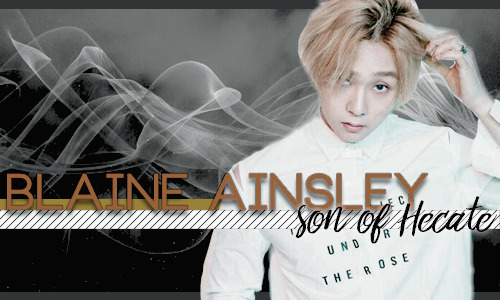
We have a new citizen in Mount Phoenix:
Blaine Ainsley, who is known by no other name;
a 21 year old son of Hecate.
He is a student and florist/cashier at Blossoms of Yggdrasil.
FC NAME/GROUP: Kim Hyojong/Pentagon
CHARACTER NAME: Blaine Ainsley
AGE/DATE OF BIRTH: April 12th, 1997
PLACE OF BIRTH: Unknown
OCCUPATION: Student, Flourist and Cashier at Blossoms of Yggdrasil
HEIGHT: 174cm
WEIGHT: 60 kg
DEFINING FEATURES: a few scars from the beatings, full sleeves of tattoos, moon birthmark on forehead
PERSONALITY: Blaine is quiet and brooding. He’s known for his edginess, the type to give into the adrenaline but his years of solitary has only allowed him to expirence the world up to a teenagers level. He’s very into video games, and he a knack for technology. And though his face and stare can seem intimidating he indeed is ready and willing to kneel to anyone who dares to dominate him, its all a matter of breaking him open. He plays baseball for the university team as a pitcher so sports hold a spot in his heart. Though his age has reached far beyond teen years its hard for him to release from that bratty mentality.
HISTORY: 1997 - A child was born, but seemingly without a mother. Left to rot in some dark alleyway, maybe not unwanted but unable to be cared for. Not much was going on in his own country, yet the child was exchanged in hand after hand. Different caretaker after different caretaker and soon he was landed in a foreign land. He’d known nothing about the western world, or even anything outside of the crumbling orphanage. The only one of his kind, species, and race in a large castle cared by a loving couple. They’d taught him English, and their way of living, though his appearance couldn’t be changed that made sure that he knew his ancestry, and his heritage as well, though bringing him up in a England home.
2007 - They left for America, entering the states where Mary, his caretaker followed her husband, taking the children with her. He was her pride and joy, though most frowned upon her having an Asian child amongst the boys she took care of. She never felt their words, only protected Blaine more so, she taught him things, kept him close, and he excelled well above the other boys who lived in their new home. His smarts were well above average, setting some sort of standard in their home, and though the other boys hated it, they still considered him as one of their own, a brother, who’d they’d play within the Connecticut meadows, cooked and cleaned with, grew with.
2013 - Hell had began to strike the boys home. Strange occurrences, floating objects, things disappearing or turning into butterflies, only happening in Blaine’s presence, and while the boys in the home thought it was cool, different, the Mrs. began to fear her golden boy, fear what he was, and what the people around him would do in regards. Salem was bubbling with hatred, and while history speaks of their hunt on witches, they hunted other species as well, a trait they even in this day and age still hadn’t gotten rid of And the Mrs. did her best to contain him, to hide him away, a sixteen-year-old boy turned into a prisoner because of what he was, what he was becoming. She was unable to hide him for long, they found him, rumors from one of the boys in the home spreading like wildfire among the community and they came in mobs, dragging him kicking and screaming out of the home. They planned to torture him until he confessed to his witchcraft, believing it was just the occult practice, when in actuality, Blaine had been born that way, and not just a witch, but the son of a goddess who had lain with one of the most vile things that could erupt from the underworld. His magic was powerful, but most of it dark though he could only harness it with the book, he’d been given by the Mrs. (telling him that the foster system had said he’d been found with it) They beat and raped him until he was a bloody pulp in the middle of their small town, a town sworn to secrecy thinking they’d murdered the boy on their lynching expedition. But he was found, nursed back to health, though this time not by the Mrs. by a stranger that harbored his same abilities. One that brought him on to be his apprentice shortly after, in three short years showing him the basics of his powers, though time was short,
2017 - Blaine couldn’t be closed off from the rest of the world for too long. Told that ‘if he turly wants to be a powerful witch, he’d have to incorporate the rest of the world in his teachings’ but he was also told he’d never been safe here, so they showed him Mount Phoenix a place where people like him cold flourish, and soon after he was settled, he was once again alone, just as he was brought in the world.
PANTHEON: Greek
CHILD OF: Hecate
POWERS: Blaine has the power of mystokinesis or magic but his is only limited to the spells that are written and given in the spell book his mother left for him. His witch elemental powers are fire and water a minut power he has yet to gain control over. It’s limited to creating and controlling water when it’s available as well as fire and temperature. It often only shows when his emotions seem to get the best in him. His magic is moon related therefore he gains more strength in the night times.
STRENGTHS:
strong willed
graceful
intelligent
curious
candid
WEAKNESSES:
naive
stubborn
over thinker
reserved
shy
4 notes
·
View notes
Link
Our hero committed sexual assault.
There’s no getting around this fact. It happened. We watched it happen. Sydney explicitly says it in the final minutes of the episode: “You drugged me and had sex with me.” It feels important to say it up front, before anything else. I must have started and re-started this review a half-dozen times, and there’s no other way to address David’s act without seeming to minimize the impact of what took place. There are ways the show can deal with this next season, and there are stories that can be told, but as it turns out, it wasn’t just a comic-book conceit to have the characters imply David might be the villain of this story. David is the villain. And to quote Syd, maybe he always was.
This is upsetting, disturbing stuff, and for the first time since I began watching this weird and often wonderful show, I’m not convinced Legion is capable of telling the story it just waded into. To understand why is to pull at the messy threads of narrative convention. I spoke at length in last week’s review about what has made this such a polarizing season of television. Legion has been shedding viewers, and I think it has a lot to do with the willfully alienating nature of the story. It became positively Brechtian in its refusal to allow the audience a point of identification, or a way to trust the show. Not just in the sense that we couldn’t necessarily trust our own eyes—we’ve known from the start that reality is malleable when it comes to the powers of David Haller and the Shadow King—but in not providing us with protagonists in whom we can believe. We can’t trust David, we can’t really trust anyone, not with delusion creatures roaming free.
Legion stripped away our ability to look to its characters for reassurance, which is a foundational building block of humanism and empathy. One of the reasons the Loudermilks have become so appealing this season is because their guilelessness makes them some of the only people that convey a sense of reliability. I can believe in them—or at least, the show hasn’t given me much reason to actively not believe in them, which is something I can no longer say with much confidence about any other character, really.
A second issue is about the implicit contract between audience and show. When we’re given a protagonist, we plan to follow them on their journey, and we have certain expectations that accompany such a journey, for good or ill. A key expectation is that we will be given entry into a character’s point of view. We need to know who a person is, and if we’re given that, we can follow them anywhere. Good guys like Leslie Knope, antiheroes like Tony Soprano, grouchy bastards like Gregory House, even good-to-bad characters like Walter White—they can lie, cheat, steal, hell, even poison a child in Walter’s case, and as long as we know their motivations, their point of view, and the perspective of those around them, we can go on that journey. We don’t need our characters to be heroes.
But this is Legion, a Marvel superhero show. What has made it consistently fascinating is the way that Noah Hawley and his creative team have repeatedly pushed back against those expectations, not caring that it would alienate people looking for a certain familiar structure in their TV series. Yet when it comes to character, there might be certain rules that work better unbroken. Removing our ability to relate to characters, and stripping away the humanism that undergirds our identification with the people whose lives we’re watching unfold, is a fundamentally avant-garde move, because it severs the basic premise of narrative drama: Namely, that we can understand who this person is and why they do what they do.
If you’re halfway through watching Out Of Africa, you know you’re not going to have a sudden smash cut to a pornographic, throbbing sex scene between Robert Redford, Meryl Streep, and another person, because that would violate a basic understanding of the world that’s been established, what a mainstream movie provides, and also how these characters would behave. Similarly, Legion has established that there are many facets to David, but despite the depictions of a malevolent David, or a homeless crazy David, or even the fears of our primary David about the violence he’s capable of inflicting (something that wasn’t even introduced until the last couple of episodes), we had been given a fundamentally good person. Naive, even, in his sincere belief in true love, admirable in his loyalty to his friends, and—above all—steadfast in his refusal to accept evil or unhappiness as the outcome. When Syd brooded over their likely unhappy ending, David was the one to say he believed in a better one. Even when he was torturing Oliver last week, we may not have liked it, but we understood doing something bad to achieve something good. He was trying to save Syd.
Transforming David from a fundamentally decent person with a troubled mind into someone capable of committing sexual assault in the course of a single episode is the needle scratch on the record player. It’s the porn scene in the middle of Out Of Africa. It’s edgy and unpredictable, but that doesn’t make it good. It changes the show on a fundamental level—and more than that, it pulls the rug out from under its viewers, scorning them for thinking they were watching one kind of show when in fact they were watching a very different one. It’s one thing to have a show’s characters lie to us. It’s quite another when a show lies to its audience.
There’s an argument to be made that these kinds of stories should be told. From the perspective of a show looking to tell difficult tales about difficult people, the decision to have David do this to Syd probably felt like an all-too-accurate and believable version of how these events play out in everyday life, albeit aided by psychic powers instead of roofies. But I’m not sure a show where guys with baskets on their heads and kung-fu fight scenes set to Jane’s Addiction has earned that story beat. When someone on a Marvel superhero show—even one as odd as Legion—tells us a character might become a villain, we allow for powers, and betrayal, and even violence. But abruptly pivoting to a painful and common reality feels like a betrayal of the narrative contract the series spent two seasons establishing. Farouk is a rapist—he is the villain and has been clearly established as such, so we accept it. I don’t know if I can accept David’s actions, not when they haven’t been properly set up narratively and justified psychologically, both on our end and his.
David defeats the Shadow King (thanks to Lenny’s bullet and the Choke) and starts pounding him senseless, but before he can land a fatal blow, Syd shows up and tries to shoot him, having been convinced by Farouk-Melanie that her beau was indeed becoming a monster who must be stopped. It’s understandable David would feel betrayed; he had just done a bunch of ugly stuff, all in the name of protecting his love. (“It’s what we have to save,” he again echoed in his words to Oliver.) And he’s not that person—not yet, anyway. It’s actually very easy to feel for David in that moment, as he’s so hurt: “Don’t you trust me?”
So when he wakes up in his own basement, and proceeds to have the three-way argument with himself, you can see why these new versions of David have erupted. He’s wounded, and the one person he truly loved has somehow rejected him in the most clear-cut manner imaginable, so a part of him tries to make sense of it in any way he can. Hence the disagreement—she’s his parasite, her love is the delusion, they all owe David everything and he should just take charge as a superior being. The episode continually returns to the God metaphor, from his quick aside to Lenny (“God has plans for you”) to Clark’s season-ending words: “Now we pray.”
Even Farouk is sounding like the voice of reason in that regard. David’s late night debate with his tormentor hinged on the Shadow King making David see how his actions weren’t all that different from Farouk’s. The moment that Farouk makes David realize how his efforts will backfire—and we learn just what David did to Syd—is a brutal one. The decision to suppress her memories is indeed a form of drugging her—he’s altering her perception to get what he wants, and once Farouk is safely contained, and Syd’s in her room, he projects himself in there, tells her everything’s fine, and proceeds to sleep with her. It’s vile stuff—there’s a reason that when Buffy The Vampire Slayer pulled a lesser but quite similar move, it made sure to have the victim discover she’d been magically drugged before any intimacy happened. Because that’s a line that can’t really be walked back, character-wise.
And part of the problem is that the show itself doesn’t seem to understand the severity of that breach. “The Trial Of The Shadow King,” with its text-based reflections on the nature of truth, muses that perhaps the competing realities of the situation should give us pause. That perhaps everyone has been swayed by the Shadow King’s machinations, which is why poor David has been found crazy and in need of either medicated imprisonment or death. And hey, that would’ve been a great place to end the season—with a knotty ambiguous debate over reality itself. But Syd’s statement of what David has done isn’t something you can muck about with, hemming and hawing over whether reality is being distorted. And it’s a disservice to the intensity of that choice—and the legitimacy of Syd’s assault—to fold it into the show’s usual “who can say what truth is?” philosophizing.
And maybe that’s the big problem with the second-season finale of Legion: Certain acts don’t get to be up for debate, and it’s a cheat on the show’s part to think sexual assault can just be part of the furniture. When nothing can be spared from getting walked back, when we are potentially being lied to about everything, then our sense of investment, our stakes in this world, go out the window. Acts need to have meaning, not be idly ruminated on with quotes from Plato. Does Legion really think there are competing truths about what David did, regardless of whether the Shadow King has everyone in his thrall? If so, then the closing words of the Tori Amos cover that ends the season are apt in more ways than one: “This is not real / This is not really happening, hey.” It’s not until the credits roll that the next line arrives—“You bet your life it is.”
Stray observations
Legion significant music cues of the week: They all pretty much pale compared to that opening version of The Who’s “Behind Blue Eyes” that David and Farouk are singing, with its spot-on lyrics. (“No one knows what it’s like to be the bad man, to be the sad man...my love is vengeance.”) But the others are the aforementioned show-closing cover of “Cornflake Girl” (if you want a great rock cover of that one, here it is), and when David’s in his own room, about to go back on the plan the other Davids apparently concocted, a similarly dark cover of The Kinks’ “Nothing In This World” is playing.
“I’m a good person. I deserve love.” This would’ve landed so much harder if David hadn’t just done what he did.
I don’t think it’s a coincidence that the Loudermilks have been our most reliable source of identification and Cary is the one who discovers what David did to Syd.
When the mouse first showed up in Farouk’s cell, was anyone else thinking it was going to start singing Bryan Ferry?
Oliver and Melanie’s flash-forward, with them living in the ice cube three years after the events of this episode, was a rare and much-valued moment of levity.
“You really believe that? God loves sinners best?” Methinks we’re going to find out. Dan Stevens’ performance this year has been stellar.
Thanks, everyone, for watching and reading. I’ve enjoyed hearing all the theories and discussions of this very unusual season of television. Sorry it had to end on a down note—I can certainly say I’ll be curious to see where Legion tries to go from here.
#(um...yeah I'm kinda dealing with this too tbh; kept saying He should ask her if she wants it he should ask her...)#Legion Season 2 Review#Spoilers#AV Club
1 note
·
View note
Text
Fear and Other Related Emotions
TITLE: Fear and Other Related Emotions
CHAPTER NO./ONE SHOT: Chapter-16
AUTHOR: latent-thoughts
ORIGINAL IMAGINE: Imagine meeting Loki to interrogate him while he is incarcerated in the Helicarrier glass enclosure. He initially tries to scare you away but then becomes interested in you as you keep talking to him.
RATING: NC-17/ MA
NOTES/WARNINGS: Warning for explicit sexual situations and violence (combat/fighting/interrogations).
A/N: Updating after a long time. Apologies. Lots of plot, backstory and some itsy bitsy feels…
________________________________________
“So… I’ve wanted to ask you this for the longest time,” Reva said, tracing the engraved designs on his armour with her index finger. “What all is depicted on your armour?”
They were finally back in New York after their whirlwind trip across the globe. Reva was checking her emails as Loki sat beside her on the couch, very distracting in his shirtlessness. He was busy cleaning his armour and daggers with his magic.
To her, they didn’t even look dirty, just a bit aged. Like antiques. They were perhaps older than her family tree’s oldest known branch… Loki himself was.
That thought was a bit unsettling, so she let it slide and paid attention to him as he began speaking.
“This is Fenris, the wolf,” he said, pointing to the shoulder pad. Then, he lifted the diagonal shoulder belt and brought her attention to it. “And this here is Jormugandr, the winged serpent.”
Reva gaped at him. “Are these your children? Those myths about you are true?”
He sighed, laying his head against the couch’s back. “In a way, yes, they are my children.”
She may have squeaked as he answered, but she didn’t care. Loki’s monster children were real, and that was enough to send her mind into a frenzy. He chuckled and arched an eyebrow as he pointedly stared at her.
“Just answer a bit more plainly,” she grumbled, feeling extremely uneasy, but wanting to know the truth nonetheless. “Nuance is kinda lost on me right now.”
He smiled wide, clearly amused by her concern. “One of my so-called wives was actually one of my mentors. Lady of Iárnvidia, the mistress of fire sorcery. She is more notoriously known as Angrboda here, for she has a temper that rivals Surtur’s fire itself.”
She put her laptop aside and brought her knees to her chest as she stared at Loki in shock. “Angrboda, Surtur… I was hoping that these weren’t real people, but I guess they are. That’s kind of scary. And she was your teacher?”
He nodded. “She was indeed, and she’s intimidating and stern. Especially when you’re a new pupil… more particularly if you’re disposed to causing mischief.”
“The legends say you had three children with her. You took the name of two of them and called them your children. Care to clear that up?”
Loki gave her an indulgent smile. “Oh, the spin that everyone has put on that. I suppose everyone is pleased to see disgraced royalty. Those children indeed are Fenris, Jormugandr and Hel. I was given a quest by Lady of Iárnvidia, to create two most interesting creatures through a combination of my magic and what she had taught me. I took some of the traits of animals found on Asgard and combined them with the traits of animals of Iárnvidia. Fenris and Jormugandr were the result of that. I may have been a bit too enthused about making them much bigger than any of those original animals.”
“So you created them, but in a way that a genetic engineer creates a hybrid animal?”
Loki considered her analogy for a second, and then nodded in agreement. “That is quite accurate, actually.”
“And this Iárnvidia, is that a separate planet? A realm, as you call it?”
“It’s part of Muspelheim, the realm of Fire Giants. Surtur lords over most of it, except for Iárnvidia. That is the territory of the Lady of Iárnvidia and her tribe of trolls. It’s the coolest part of the realm, and is actually somewhat bearable to live in. Still, I was nearly always covered in sweat during my stay there.”
She tried not to giggle when he said ‘coolest’ and kept a straight face. “So… your teacher is a troll?”
Loki smirked at her. “Not the internet variety, but yes.”
Reva knew not to be surprised that he knew who internet trolls were. After all, he had come to her asking for a date.
“There is so much I don’t know about you,” she observed aloud, looking at the various kinds of daggers he had laid out on the coffee table. “What about that horse thing?”
Loki rolled his eyes. “Another animal I created. I had designed it as a steed for Odin. It was my gift to him, to show him my talents… to show him how capable I was. Though, that happened in Asgard, after I had been brought back from Iárnvidia.”
Something about the way he said it made her take notice. He seemed… upset about it for some reason.
“You wanted to stay in Iárnvidia only?” she asked tentatively, watching his face closely to see how he reacted.
He grimaced and looked away, halting the magic aided cleaning of his vambraces. “Not really, but Odin didn’t let me stay the duration of my apprenticeship. He sent a whole convoy of Einherjar to have me escorted back to Asgard.”
“But why?”
“Though he never explained any of his actions to me, he did so to my mother. He didn’t trust me, and at that time, I didn’t understand why. I eavesdropped on that conversation… till I got caught by both.” He looked back at Reva and gave her a rueful smile. “It’s hard to eavesdrop on two seidr wielders.”
Behind that smile hid a pain that emanated from his unhealed wounds of psychological trauma. She sympathized with him, and even if she couldn’t empathize. And she wanted to help, but knew it was tricky.
She shifted closer, adjusting herself behind him so that she sat with her legs on either side of his torso, cradling his very nice behind between them. “So tell me about the rest of your so-called brood.”
He grumbled under his breath, something about her ‘damned curiosity’. She didn’t give up, though.
“Please…” She wrapped her arms around his midriff and planted kisses on his neck and shoulder.
He groaned and sighed, and she smelt triumph.
“Hel is the only one left.”
“Tell me how you created her.” She curled her legs over his thighs, fully wrapping herself around him. It felt extremely comfortable.
“I didn’t. She was… released back into our dimension of Yggdrasil. I broke her captivity between dimensions, though, not by intent. I didn’t even know the full details of it until recently, when I met her after my death.”
Reva stopped her cuddly behaviour immediately. “Wait. You actually died?”
“Yes.” There was a distinct edginess in his voice, and it gave Reva a feeling close to dread. Her mind worked in overdrive.
“And knowing her domain from mythology… did she send you back?”
He nodded.
“Why?”
“Because she was grateful to me for releasing her and giving her a new form through my magic. She has taken my name for her father, even though she’s much more ancient than me.”
It was obvious, with the bitterness with which he was relaying all this to her, that he didn’t hold much love for Hel.
“How did you even release her?”
“An experiment with magic and an ancient tome hidden beneath the weapons vault of Asgard. My curiosity led me to do quite a lot of unwise things. I remember recreating the runes and tracing them with my fingers… fingers which were crackling with my seidr. I can’t recall anything else, except blacking out soon after. I was found in a meadow in the far reaches of Asgard. Mother told me that I had been missing for a whole week.”
Well shit…
She could feel the tension rolling off him, and to ease his distress, she began combing her fingers through his hair. He sighed and leaned into her touch, reminding her of a cat accepting affection.
“She has my features and my dark hair, like a true daughter would. It’s nigh unsettling.”
“Hmm, please tell me you won’t be seeing her again any time soon?”
He hesitated before responding. “I’m trying not to.”
“Good, now tell about this Sigyn business,” she said, wanting to change the topic to stop his mood from heading south. “Because I sure as hell am not sharing you with anyone.”
“You’ve been reading about me quite a lot, haven’t you?”
“I’ve read your myths before, but not in such detail. You gotta be thorough in your background checks when you have a mischievous god for a lover.”
“I’m afraid more than half of the tales are just that, tales. And Sigyn is more of a title, not a name or a real person. It is a title bestowed to my would-be wife, for she shall bring me victory. Just a passing prophesy by a Vǫlva. Doesn’t hold much weight for me.”
“Didn’t that push you to try to marry as soon as possible?” she asked, genuinely interested, though feeling a weird pang of jealousy at the mention of a future wife.
“I tried to court a few ladies from Asgard’s nobility. No one showed much interest in me, considering the widespread rumour that I had congressed with a horse and given birth to an eight-legged colt.”
“Jeez… how did that story circulate, right down to Midgard, even?”
“Some people thought it necessary to mar my success as a mage for the sake of jocularity. I believe one of Thor’s friends came up with that story.”
“I’m sorry.”
“No need to feel sorry. It happened a long time ago.” A mischievous air entered his tone then. “I’ve taken my fair share of revenge for it.”
He reached behind to pull her hands back to his hair. Only then did she realize that she had stopped massaging his scalp. Without any mention of it, she resumed the head massage, though secretly finding it adorable that he prompted her to keep at it.
___________________________________________
“The great Loki of the Nine Realms, it is a pleasure to have your presence grace my realms.”
He stood before her, though disbelieving in the reality of meeting death as a personification. The fact that she had his colouring was all the more disconcerting. Still, he acted unsurprised, as he was wont to do. Even in death, he was himself.
“I’m not sure what makes me ‘great’ or the reason why my presence would please you. Nonetheless, I’m glad to have brought you pleasure.”
“Always with such elegant eloquence. It saddens me that you are here before your time.” She didn’t look sad at all.
“I share that sentiment, your ladyship.”
“You may call me by my name.”
“That would suggest a certain level of familiarity between us, which I do not have the privilege of.”
“You are aware that you are known as my father in the legends of the old. That would afford you the requisite familiarity, would it not?”
“I apologize for that bit of rumour. I did not have any hand in spreading it.” Damn those Midgardians…
“But you did have a hand in my second birth, so to say, and hence, you are well deserving of the title.”
This time he couldn’t contain his surprise. “Pardon me, your ladyship, for I do not understand.”
“Remember your youthful days of wonder? Learning new forms of seidr, using them to create all sorts of eclectic creatures… who later came to be known as your sons.”
Loki sighed at the memory. “Yes. I did not have a hand in spreading those rumours as well.”
“Of course. So… besides these creatures, do you remember creating a girl?”
“I… no.” He swallowed, wondering where she was taking this conversation.
She gave him a beatific smile. “Yes, Phatḗr, it was I you created, or more aptly, released from my sad confines.”
Loki narrowed his eyes. “But… how? I wasn’t even a master back then.”
“You used my sigils and runes in your spell, unknowing of their deeper meaning. You had the innate magical prowess to carry it out, given your heritage. I had been trapped between dimensions by a competing force, but your use of my sigils restored me to your world.”
“Competing force?”
“An elite band of sorcerers… thought trapping me between dimensions would ensure immortality for everyone. Little did they know, death is inevitable.” She laughed, and the sound was… harsh on his ears. “You were young and innocent of your actions then, but capable enough of breaking the spells of masters of the old. It can be said that there may well be truth in that prophecy about you being a world breaker.”
“The world still stands alive and well, while I am the one broken and dead.”
“Not for long. You do not belong here, Phatḗr. At least, not for a few thousand years.”
He chuckled. “Am I such a nuisance that you will not accept me here?”
“Nuisance you are, but not for the likes of me.” She turned her attention from him to observe her nails, as if bored. “Besides, you are so much more than mere nuisance.”
“I have been called worse. So where do you wish to send me to suffer my afterlife?” He really hadn’t much of an idea of afterlife, but he was willing to go into the oblivion. He was tired… and he wanted to lay himself to rest.
“Afterlife does not await you yet. You are restoring yourself as we speak.”
Her words brought him back from the thoughts of oblivion. “Once again, I’m deeply mystified by your words, Lady Hel.”
“Call me Hela, or better yet, dóttir.
Loki grunted in frustration, but followed her request. “Dýrr dóttir, please explain your puzzling words to your slow old man.”
She smiled delightfully. “You’ll be alive soon, upon my command. You bestowed me with my second life, so to say. I’ll give yours. However, I cannot let you go without a pledge on your behalf.”
“I see you like your bargains, much as the legends tell about you.”
She smiled, and he just about contained a shudder. “What can I say, I’m my father’s daughter. It is the twin realms’ most sacred rule, one even I cannot break.
“What must I pledge to ensure my safe passage back to the realms of the living?”
“To bring me what I most want.”
“And what would that be?”
“That is for you to decipher.”
“What if I fail at my endeavour to decipher or fulfil my pledge? I’m assuming I’ll be brought back here?” He chuckled darkly, feeling cavalier about his own life and death. He felt rather reluctant to go back to a life of struggles and little else.
“It’s not so simple, ungr Konungr.”
He was intrigued by the very specific title she used for him—of a young king. “I’m all ears, dýrr dóttir.”
“Should you fail to bring me my most coveted, I shall be liable to take yours.”
“I suppose that’s a very circuitous way to say you’ll take my life again.”
She gave him a deep, meaningful glare. “Do not assume in haste the true bearing of my words.”
“I will try my best to heed them.”
“You will heed them, or face the penalty of not satisfying your end of the bargain.”
She stood up and walked down the dais slowly, until she reached him. Once again, he was mystified by the uncanny resemblance between the both of them.
“May you have much luck in your second breath of life, of which none you possessed in your first, dýrr Phatḗr. It’s a prospect in changing the course of things and claiming what’s rightfully yours. Bear your epithet in a most propitious sagacity and the new order shall bow to you. However, must you veer from your course, there shall be no hope for you.”
Loki stood rigid in his place as the Queen of the realms of death embraced him, bringing their foreheads together. Her hands, seemingly pale and delicate, traced the taut muscles of his arms and shoulders, his chest and back, releasing a strange energy that seemed to crackle at her fingertips.
Her lips brushed against his as she murmured an incantation in the old tongue. He kept himself still as a statue… trying to absorb the strange interaction.
“Now open your eyes and be born again, Loki of the Nine Realms.”
Loki’s eyes snapped open and he started, his breaths coming in shallow gasps. His vision was unfocused, marred by brilliant colours.
“Loki, can you hear me?”
He grabbed the source of that voice and heard a squeak.
“Loki! Try to count!”
Reva…
Her voice was strained. Something was wrong. Very wrong.
He blinked and put his training as a sorcerer to use… slowly bringing his faculties back to normal, breathing steadily.
That is when he focused on her. She was caught in his grip, and she was biting her lip in distress. His grip. It was too tight. He let go of her immediately and left the bed in haste.
“Loki,” she called after him. “I could help.”
“I… need time to myself, Reva, please.”
He left the room without a backward glance, and locked it with his magic to ensure that she didn’t follow him outside.
Once out in the space called the ‘living room’, he let himself sit on the floor and prepared to meditate…
After about three hours, he felt calm enough to head back to Reva. He usually didn’t get night terrors or dreams that wove back into his memories. Rare as it was, it did strike tonight.
Tonight…
Suddenly, his attention was caught by the date. Quickly, he pulled the time keeping device from his interdimensional pocket and double checked the date, if only to assure himself that he had some time left.
The device didn’t assure him, it told him the harsh truth—it was time for the dreaded ritual.
Back in the room, Reva was fast asleep. Loki felt guilt hover over his conscience… but he shoved it aside.
It was time.
__________________________________________
Reva was pretty sure she was having a nightmare, and wondered if it was linked to seeing Loki suffer through one. She was lying in her bed, but something was very wrong. The need to wake up was there, but she felt unable to do so.
She felt pricks on her skin, like several tiny needles were being inserted into her. It was focused on her pulse points. It wasn’t all that painful, but a very strange sensation nonetheless, unlike anything she had ever felt.
Once again, she tried to awaken, but she was unable to open her eyes or move her limbs.
Oh shit, sleep paralysis… the thought floated inside her sleep-clouded brain.
She hated the phenomenon. Well, everyone hated it.
Moaning, she tried to move again, but only achieved failure in doing so. She would have shouted expletives if she could. Somewhere in her attempts to move, she realized she was probably experiencing hypnagogia, because she felt very aware of herself and her body.
And then it worsened, and she truly grew afraid. It felt as if she was being imbued with some sort of energy. Her skin became fevered, with beads of perspiration forming everywhere.
A thought struck her—she had felt a similar energy before… but where?
The answer came to her after a long time searching through her hazy brain.
The scepter…
But she hadn’t cuddled with the scepter before sleeping. She had worried over Loki before falling into an exhausted sleep.
Loki… could he help her?
She tried to call his name, but her lips seemed sealed shut. Still, she kept trying…
After what seemed like an eternity, her eyelids obeyed her and fluttered open. The first thing she saw was Loki’s face, hovering over her with an overwrought expression and manic eyes.
He was talking to her. Initially, she couldn’t understand a word of what he said. It came to her slowly.
“Shhh… It’s all right,” he said, hands cradling her face. “It shall pass. It’ll get better.”
“Wha?” she croaked, her voice broken and garbled. “What’s… happening?”
“Nothing at all…” He said something else, but she was certain it wasn’t in English. “You’ll be safe. I’ll keep you safe.”
Something in his countenance bothered her, and there was an edge to his voice as well. He looked almost eager in the way he was staring at her.
“Don’t feel well,” she cried out, “everything’s so heavy. Can’t move.”
He shushed her again, and then she heard a clinking noise—metal against metal and something else she couldn’t identify.
The pricks on her skin grew painful. She felt flooded with the same energy she had felt before, but it came with an unfamiliar agony this time round. Everything hurt…
“Loki help,” she pleaded desperately, her eyes filling with tears of anguish.
He simply looked at her as though he was observing a lab experiment, eyes still manic but focused.
“Loki please…” She wasn’t even sure what she was asking him to do, she just wanted this uneasy, painful and cloying energy to leave her body. She was literally getting sick of it. Throwing up was a distinct possibility.
But Loki didn’t move an inch to help her. Instead, she thought she saw a hint of a smile on his face. She didn’t like this smile, it reminded her of the Loki she had met on the helicarrier.
She tried to call his name again, to gain his mercy somehow, but her lips suddenly felt parched and her throat prickly. She realized she was panting.
Another burst of pain shot through her. She wanted to scream, but nothing came out except a hollow, silent cry.
Loki’s smile faltered a little. Then she felt water on her lips and she gulped it down urgently. It didn’t diminish the pain but it helped with her sandpapery throat.
She tried to move again, a futile effort, as she felt an invisible force holding her down.
“You’re doing well, ost min,” Loki spoke encouragingly. “Don’t worry.”
“What’re you doing to me,” she whispered as her whole body trembled under the influence of whatever substance that was coursing through her.
Tears trickled down her eyes as she tried to make sense of the situation. It was clear to her now that Loki was responsible for the suffering she was going through. What she didn’t understand was why he was doing it.
He was voluntarily hurting her, and he seemed to be content doing it. Reva wondered if this was an experiment and she was a mere guinea pig to him. Was that all she was worth to him? Was that the only reason why he showed her affection?
“Why?” she asked brokenly, her voice cracking.
“Hush, Reva.” His fingers rubbed away the tears, but the tender touch did nothing to assuage her. “This shall pass.”
“I’m hurting…” she sobbed, struggling against her invisible restraints.
He held her as she cried and murmured gentle words she didn’t understand. When he finished, somehow, the pain lessened and a heaviness came over her eyes.
“Try to go back to sleep, ost min.” He kissed her on the forehead and retreated. “The worst is over.”
She heard him move around as her eyelids closed with impending slumber. She didn’t want to sleep, and hence, she tried to fight it. But it overpowered her like a sedative and she gave in.
—————-
Reva rubbed her eyes sleepily as she tried to wake up. Sun was shining through her window, alerting her to the fact that it was way past her usual waking hour.
She went on to yawn and stretch, and it made her feel surprisingly good. A purr of contentment escaped her lips.
Beside her, she saw Loki lying in the bed, awake and watching her intently.
Loki…
Pain…
It all came back to her in a rush…
Loki had done something to her, something very painful, and he had seemed pleased about it.
No! Her mind screamed as she scrambled away from him, clutching the coverlet to her chest.
He noticed her quick movements and lifted his head to watch her move away from the bed.
“Good morning, Reva,” he greeted her with a gravelly voice, his eyes still intently focused on her as she wrapped the coverlet around her bare form.
“What did you do to me?” she asked, her voice shaking as she felt the chill of fear spread down her spine. She hadn’t felt this afraid of him ever since the helicarrier incident.
He rose from the bed and languorously strode towards her with a predator’s grace. He was naked as well, but didn’t bother to cover himself. His face bore a relaxed smile, and she had a hard time reconciling it with the fact that he had all but tortured her.
Reva backed away from him, clutching the coverlet tighter around herself. “Answer me.”
“Do you not feel it?” He brushed his knuckles across her cheek.
His touch evoked warring feelings inside her… of desire and dread, of anger and curiosity.
“I felt pain!” She batted his hand away with a snarl. He caught her wrist and he snaked his arm around her waist.
“Reva, don’t be difficult,” he said, looking into her eyes with an uncomfortable intensity, “the pain wasn’t that bad.”
“What the hell do you know about it?” She pushed against him, making him take a step back. In the struggle, the coverlet dropped, and Loki chose that moment to catch her in his arms once again.
“I’d never hurt you,” he murmured, pressing his lips to her hair. “You know this.”
Her body reacted to his proximity, answering with lust. She ignored it. Her anger was far stronger. Still, she noted how her body felt over-sensitized, every touch felt tenfold more intense.
“I thought I knew… not anymore.”
“Why are you so bothered about what I did? Do you feel worse for wear?” His fingers pressed against her temple. It was a soothing gesture but it made her anger rise.
“I feel betrayed!”
She pushed him away, and he actually stumbled. That gave her a pause. Why did he stumble?
Loki appeared to be surprised as well, but then he smirked knowingly. “What would you do if I told that yes, I did do something to you last night, but for your own good.”
“What have you done to me?” She glared at him, picking up the coverlet and wrapping it around herself again while Loki watched her like a hawk. “And why I am not a party in the decision making if it’s for my own good?”
He raised his hands in mock surrender. “Reva, sweet one, you must realize that I did what I did to keep the order of things.”
“But you caused me pain.” She felt her eyes misting, and she swallowed hard to keep the tears at bay.
“Some pains are necessary.” It looked as though he meant to say more, but he stopped abruptly. A beep of some kind came from the general direction of his armour, lying in a corner of the room.
Reva watched him with renewed apprehension as his visage betrayed surprise and irritation.
“I have to leave.”
She stared at him in numb shock as he picked his armour and magicked it onto his body smoothly. “You didn’t even answer me. Will I be in more pain?”
He tried to reach for her again and she slapped his hand away.
He sighed in response but didn’t renew his efforts to touch her. “No, the worst of it is over. You’ll be fine. Contrary what you may believe, I haven’t hurt you.”
“But—”
“Eat the foods that I have brought you. They’re in your cooling device. They’ll help you.” He seemed to hesitate as she kept glaring at him. Then he took a deep breath and nodded. “Farewell.”
He was gone in a flash of green and gold, leaving Reva to simmer in anger and defeat. Tears trickled down her cheeks as she broke down, scared and worried about whatever he had done to her.
One thought kept ricocheting in her head as she let out her anger and confusion in quiet sobs—what had she gotten herself into?
#Loki#Lover#Angst#God of Mischief#Father#Submitted fic#submission#fear and other related emotions#latent-thoughts#chapter 16#emotions#interogation#Incarceration#helicarrier#enclosure#scare#interest
71 notes
·
View notes
Note
I love Kurapika, but I often don't like how people portray him or talk about him. They make him seem like he's super edgy, super angsty, fucked-up and sad all the time and only focus on that... I think that he is not taking care of himself and not heading in a good direction, but he's not the "brooding", aloof type of person people make him out to be. Maybe the hunter arc is too long ago for people to remember that he has a hard time keeping that facade around people he actually loves?
Heya!!
Huuuh ye, I kinda agree, although I admit i’m the kind myself to often talk about his issues. It’s easier to talk about to me.
But I really dislike the words “edgy”, i’ve always seen it in context of trivializing what a character is going through and that’s why i’ve been extremely defensive most of the time ahah.
The thing is that, right now Kurapika is in a really bad place, and while indeed his facade falls around the people he loves (which we saw also in the YN arc), he is right now isolating himself from those people for that very reason. I think it may narrow down some people’s perspective.
Acknowledging bad habits and the heavy tons of his storyline doesn’t change he’s actually a gentle person, who’s kind, often teasing. And you’re right as, people shouldn’t forget that. I personally just think it brings more to his tragedy to see how much he’s cutting himself from what makes him happy to further his unhealthy habits.
That being said, I also know there are people who totally disregard this struggle and the other parts of his personality. I’ve seen all kind of people calling him “edgy” or “angsty” in a rather condecending way. I’ve seen quite a lot of people reducing his struggle to something he should just shake it off, and it rubs me the wrong way. While his struggle is nothing to make light off, it also disregard the rest of his personality.
And it happens that people forget that deep down, Kurapika isn’t like that. He’s forcing himself in situation that he dislikes, leading to him being distant, but the tragedy is there because Kurapika is not made for this kind of life to start with.
I do think maybe a balance in the words should be better. Kurapika doesn’t fall into a “super angsty” / “cinnamon roll” dicotomy or whatelse. It’s a shame if people refer him like that ;;
Take care!
#I don't remain enough in fan circles to tell tho#i mean lately i am barely even on tumblr *finger guns*#so I don't know how some people are exactly refering to him#the worst i've seen against him came from people who hated him or didn't care for him#so my experience is more on how people use it negatively rather than trivializing it#and god knows i ramble about his issues a lot ahha#so ye kjfhfd#ichafantalks hxh#take care!#Anonymous#ichareply
8 notes
·
View notes